#things have actually been pretty good
Explore tagged Tumblr posts
Text
In Loving Memory
…
For the dried sunflowers,
Rotting into the Earth,
They blossom in memory,
Remembering your mirth.
…
To the sunsets we watched,
The summers we shared,
To all the late nights,
Just because you cared.
…
For the sake of the books,
You’ll never again read me,
For all the winters lost,
And Christmases you won’t see.
…
To the end of an era,
The end of your love,
May the leaves fall on your grave,
As you smile from above.
…
#I know I haven’t been active in a while#this gives you some idea of what happened in October#but besides that#things have actually been pretty good#planning to start updating once a month again#and maybe start reblogging more#I have grad classes and work that cut into my time#but I have always enjoyed this community and would like to slowly return#so please enjoy some questionable poetry#i wrote this at a funeral and have had it in my notes since so. it’s not the most proof-read thing ive ever made#but it comes from my heart
11 notes
·
View notes
Text
Actual Ultimate Classpecting Guide
For real this time.
Buckle up, this is a really long one. For everything that's posited, I can provide textual evidence; that being said, I'm not going to be including the textual evidence within the essay itself, because it's already long enough as-is. As such, please feel free to ask for clarification or sources on any assertion, and I'll do my best to provide.
Before we begin, there's some things to discuss about how we're going to be approaching classpect in the following essay. In numbered list form for our short attention spans:
1. There is a concept Hussie talks about multiple times in his book commentary, "personality alchemy" - the idea that there are these "platonic ideals" of certain characters, which can be mixed and matched with others, in order to create new characters. The examples he gives are of how Eridan was a proto-Caliborn, how Kanaya has shades of Jade, how Nepeta was a proto-Calliope, and how Sollux and Eridan have shades of Dave in them. Classpecting is fundamentally a form of this personality alchemy:
2. Class describes the character's arc and emotional hurdles, while Aspect describes the character's base personality traits by which this arc is experienced.
3. For example, all three Seers struggle with hubris: Rose's need to be the smartest person in the room led to her being manipulated by Doc Scratch, Terezi's obsession with meting justice led to her engineering a situation where the only option was to kill Vriska, and Kankri's desire to be seen as a spiritual leader amongst his friends led to him furthering their divisions and harming them.
Then, when their pride is shattered, they cope by inflicting willful self-blindness: Rose turns to drinking herself stupid (the opposite of Light's sway over knowledge), Terezi gets down with the clown (the opposite of meting out Mind's justice, as it's a Gamzee W), Kankri goes celibate (Blood L) despite his clear romantic feelings for certain teammates.
4. As for Aspect: note how all three Life players share the personality traits of optimism, stubbornness, and obstinacy. All three Breath players share an immaturity and naïvety, and are quite frankly irresistible to people for some reason. All three Light players share a need for the spotlight and a tendency toward long-windedness and persnicketiness. So on and so forth.
What's interesting is, if you start analyzing characters that share Classes and Aspects, these specific types of similarity crop up over and over - all our Knights struggle with insecurities and facades, both our Bards have a crisis of faith. All three Breath players have an aspect of immaturity and childishness to their characters, and all three Light players are deeply concerned with appearing intelligent and feeling important.
5. As a result, this guide is NOT intended for classpecting real life people, because we are complicated, we contain multitudes, and we don't have arcs. This is primarily an analysis of what Class and Aspect mean in Homestuck based on textual evidence, because I genuinely believe that you can basically figure it out if you read carefully.
6. Duality, and the idea of "equal and opposite," are major themes within Homestuck - Prospit and Derse, Skaia (described as a crucible of birth and creativity) and the Furthest Ring (the literal afterlife). Which classes are involved in an Active/Passive split, and opposing Aspects, are the same way. This is the primary method I used to determine the Active/Passive pairings and opposing Aspects. After all, as Callie describes, both Thieves and Rogues are classes "who steal" - so, too, do I try to unify Classes by a common theme, even if they diverge wildly in how that theme is expressed (as Thieves and Rogues do). In the same way as the opposite of "up" is not "apple," but "down", because "up" and "down" are both fundamentally concerned with relative vertical position, so too can be defined concepts like Breath and Blood, Hope and Rage, Light and Void - as well as the reasoning behind Class pairings like Heir and Page, Maid and Knight, and Seer and Mage.
7. Descriptions for both Class and Aspect are left deliberately vague and up to interpretation within the comic itself, and this is by design: the actual manifestations of an Aspect can vary wildly given the Class, and even individual person, that it's tied to. Calliope even makes note of the fact that, under the right circumstances, someone can manifest effects that appear to be the opposite of their aspect. She's also careful to couch her language in "may" and "can" - because these concepts are intentionally somewhat nebulous and malleable. As such, while this guide certainly lays down what can be gleaned and inferred from the text, do note that Homestuck runs on a soft magic system, and as such, nothing stated is firm, 100%, must-always-be-this-way - just an overview of what we've seen.
8. There is often great overlap between Aspects, Classes, and Classpects - which Calliope herself notes. Heart and Blood are one of the most salient, as they both have a fixation on relationships, and Calliope mentions that under the right circumstances, a Classpect may even be able to manifest what appears to be the opposite of their Aspect. Again, Homestuck operates on a soft magic system, so this is a feature, not a bug.
ASPECT
There's a little less to say about Aspect, not because it's less complicated, but because "base personality traits" are much more nebulous compared to Class's sway over character arc. Still, Aspect represents the fundamental way a character is, and thus, color every interaction that character has. There's a reason Ultimate Selfhood is sought through Aspect, not Class - Aspect is the core of the character's being, what makes that person that person.
That all being said, Class has major sway over how an Aspect manifests, and certain classes can even invert the Aspect and even the character's role in the party. As such, these descriptions must be parsed carefully in relation to Class. Moreover, due to the soft magic system, there is at times overlap between unrelated Aspects, which can also be exacerbated by Class - Heart and Blood being the most obvious in this regard. Still, overall, you'll find the Aspects to be fairly distinct from one another.
Please also note that every Aspect can deal with its literal counterpart by default - Light players can wield lasers, Breath players can wield the breeze, et cetera. Because this kind of goes without saying, and because the non-literal stuff is more interesting to discuss, I'm not really going to go into too much detail about the literal qualities.
SPACE / TIME
Space and Time are both concerned with physical reality, goals, and the way one approaches them.
Space is associated with "the big picture" - with recycling, reproduction, and the interconnectivity of all things. The aspect also presides over the enjoyment of the journey over the destination - Space players serve as reminders that the present moment is as important as the end goal. Space is often a more passive Aspect, being the stage upon which the story is set. They're the hosts of the party, and the one who marks the ending.
Its players reflect these tendencies, often being feminine, with penchants for life-giving acts such as gardening. Their personalities tend towards frivolity and silliness, finding it difficult to stay on-topic or bring full gravitas to serious situations. Perhaps a better word would be "distractable;" when the aspect is so concerned with all things in connection with each other, it's easy to lose track of details, and it's easy to enjoy things simply as they come. Space players tend to be kind, patient, and forgiving, which is a strength as much as it is a flaw; it's easy for malicious actors to take advantage of this compassion, or for the Space player to find themselves in a poor situation by being overly permissive. They can easily be painted over by stronger personalities, and tend to struggle with romantic relationships, as they attract many with their kind and giving natures, and few are naturally so considerate of the Space player in turn.
A Space player's struggle lies in finding the strength to assert themselves, picking out the good from the bad, weeding the garden so it can flourish and thrive.
Time, in contrast, is associated with "the little things" - with details, minutiae, and processes. Time presides over the struggle toward something greater, the endurance of hardship with an eye on the prize - the destination over the journey. Time players are the ones keeping track of the tasklist, marking off each item as it reaches completion; they are the tireless workers keeping the whole engine running.
Time players, thus, are ones whose lives are marked by struggle. They are highly goal-oriented; in contrast to how Space players can easily move from goal to goal, task to task, Time players feel bound to see things through to the end, finding satisfaction only when they've achieved their desired result - and only until they come across the next goal in their journey. A Time player isn't happy without a goal to work towards, a craft to polish, a prize to win - but this driven nature can easily be its own downfall, as it leaves little room for the player to admit to their own shortcomings, or ask for help from others. Moreover, their focus on minutiae can leave them blinded to the bigger picture, and it's easy for a time player to fall to despair, able to do nothing more but spin their wheels. They're prone to directionless anguish, frustration, and resentment towards the seeming futility of their actions, becoming destructive and defiant even when it doesn't serve them to do so. In the worst case scenario, detach entirely, coming to a standstill.
A Time player's struggle lies in finding peace with themselves, such that they can enjoy the fruits of their own labor - labor whose rewards only multiply when the cause and methodology become clear.
BREATH / BLOOD
Breath and Blood are both concerned with directionality, interpersonal relationships, and autonomy.
Breath is the Aspect governing freedom, liberty, and independence; it is a force that breaks shackles, clears out social norms, and refutes "the rules," whatever those rules may be. Breath players can't be tied down, whether by physical bonds, societal rules, or even the ineffable forces of the narrative itself. They are leaders of example, pioneers, and trailblazers, opening new paths for their teammates to follow.
Breath players are goofy and gullible, often with hearts full of childlike whimsy, naivety, and even immaturity. They are friendly and well-meaning, fond of simpler things, and easily swayed by others. They approach the world with a sincere earnestness, which is not always well-received. Something about this sincerity seems to make Breath players irresistible to others, and they often find themselves the subject of romantic attraction. However, in this childishness is also the great pitfall of many Breath players - their natures are naturally conflict-averse, and egotistical the way a child can be, failing to see beyond themselves. They can be incredibly callous when not considering the consequences of their actions, or the viewpoints of others. Their easy-come, easy-go natures make it difficult to focus them towards a goal, and it's easy for them to simply allow themselves to be tossed around by circumstance and the whims of others, or to simply run away from their problems entirely - never confronting their own responsibility or fault for a situation, passing along the blame.
A Breath player's struggle is letting themselves mature - letting themselves take responsibility, and understand that their actions have consequences for others. Only then can their breeze blow in the party's sails, aiming towards victory, breaking through all obstacles to reach it.
Blood, in sharp contrast, is the aspect that governs bondage, contracts, and interdependence. It is a force that binds. Under Blood's sway are not only romantic entanglements, but familial, friendly, and societal ones as well. This aspect sees overlap with Heart, but the division is this: Heart concerns itself with feelings, and Blood concerns itself with compatibility. Blood players are diplomats, forces that remind us all that we are more similar than we are different, and that that similarity should bring us together when we are on the verge of pulling apart.
Blood players, reflective of their Aspect's association with bonds, tend to be neurotic and obsessive. They have a tendency to over-examine and overthink, constantly fretting over the infinite and infinitesimal variables that influence the shape of society and interpersonal relationships. However, this judgmental nature stems from a deep well of idealism and empathy; Blood players can't help but care about others and wish for the best for them. In a way, this makes them one of the most mature members of the team, capable of cutting through to the core of other peoples' interpersonal issues. Unfortunately, their prowess does not extend inwards, and their assessment of themselves is usually direly incorrect - all the worse because Blood players always feel responsible for those around them. Blood, being the Aspect concerned with interdependence, is the weakest one when all alone. Thus, it's easy for the Blood player to wind up a nag - desperate to make sure everyone is moving according to their vision, they'll fuss and bother and interfere and boss people around until everyone else gets sick of them. It's easy for them to wind up pariahs of their own making, severing their own ties with others by their efforts to establish them.
A Blood player's challenge is of learning how to turn that empathy and honesty inwards, to calm down and let themselves enjoy the presence of others; only then can they come to know how to build something stronger and better.
LIGHT / VOID
Light and Void are both concerned with knowledge, ontology, and "narrative relevance".
Light (as well as its counterpart) are perhaps best understood through the lens of "narrative" - this idea that, of all things that do and don't exist, and all events that do and don't happen, only the ones put to page are "relevant". Thus, Light is associated with knowledge and luck - that is to say, it's associated with the knowable, the objective, and the concrete, and the ability to determine "important" events. Light players have read the book they're participating in, and able to serve as luminary guides from one plot point to another, lighting the lampposts for others to follow.
Light players, naturally, are erudite and educated, possessing keen intellects and cunning minds. They are fond of knowledge itself, of markers of status and prestige - whether that's wealth, the adulation of the masses, or a massive library. They harbor a desire to be important, to be seen, to be acknowledged, and are happiest when they are looked up to. Conversely, they deal poorly with being looked down upon. Their confidence transmutes easily into hubris, and they struggle with having that pride challenged. As such, they tend to be volatile and unpredictable, quick to retaliate against those who threaten their egos, or obsequious to those whose acknowledgement they desire. Their desire for the limelight can quickly spell disaster for those around them, who are reduced to supporting characters in their minds. Craving so much external validation, they're often blind to what would actually make them internally happy.
A Light player's challenge is of coming to terms with their own limited reach, and allowing themselves to shine not for their own desire for importance, but for the betterment of the world in which they live.
Void, in contrast, is the blank spaces between the words. That which is secret, subjective, unknowable - these are Void's domain. It's associated with taboos and hidden things, sexuality and pleasure. It's also associated with the empty canvas - the blank space before creation, and the oblivion to which creation is eventually destined for. Thus, it stands for infinite possibility, though the collapse of those possibilities into a reality removes that reality from Void's domain.
Thus are Void players ever cosigned to the background, though this generally suits them fine. Void players are very self-possessed. Where Light players tend to exaggerate and complicate, Void players are honest and simple, preferring straightforward solutions. They don't tend to think very hard, instead letting intuition and emotion guide them to where they want to be - which makes them one of the more stable and reliable personalities on a team. However, this simplistic, feelings-driven approach often leads to complications and unforeseen consequences, and very easily to irrelevance, with which Void is so closely interlinked. A Void player's reliance on emotion and intuition can result in overindulgence of pleasure, to the active detriment of the party's goals or the Void player's self-improvement, leaving them lost and irrelevant, unable to act.
A Void player's challenge is in resisting the call of the Void's temptations, instead dragging the Void behind them, kicking and screaming, to where it can be of use.
MIND / HEART
Mind and Heart are concerned with what it means to be a sentient being, with identity, and with why we do what we do.
Mind is the Aspect associated with logic, rationality, karma, ethics, and justice. To a Mind player, they "are" because they "think". They are keenly aware of the consequences of every action, and well-versed in cognition and behavior, such to the point of manipulating others with ease. Deeply concerned with the "effect" of cause-and-effect, Mind players are always cognizant of debts and credits, where justice is owed and where it has been over-meted, and their subtle machinations culminate, like well-placed dominoes, in grand finales.
Mind players are schemers - it's in their nature. They have a tendency to view the world as a puzzle or game, with themselves and the people around them as pieces on a board, and set as their standard rules the laws of ethics and karma - owed debts and overhanging credit - guilty and innocent. Mind players are wickedly cunning, and have an high success rate with every scheme they commit themselves to, but the grand downfall of all these tendencies is that they tend to lack in a sense of identity, and have a poor grasp on their own emotions or desires. While they may know how to provoke a desired reaction, they don't know how to change someone's mind. They often find themselves grappling very painfully with their own selfhood, with feelings of emptiness, inadequacy, or uncertainty; this often leads them to seek codependent relationships, hoping somehow that they can find the validation they need externally, not realizing that they're deepening their own fragile self-images.
A Mind player's challenge lies in tempering their natural understanding of karma and justice with kindness and empathy - not just to others, but to themselves, and using that enlightened understanding to lead others forth.
Heart, then, is associated with feelings, motivations, intuition, the soul, and the self. To a Heart player, they "are" because they "feel" like they are - and they're keenly aware of the multitudes that are contained within themselves. Deeply concerned with the "cause" of cause-and-effect, they're drawn to desires, those of themselves and of others, especially where strong feelings are concerned. Heart players are gifted with an intuitive understanding of those around them, both their good and bad qualities, and are tasked with the grand task of bringing out the best.
It stands to reason, then, that Heart players have a firm grasp on who they are and what they want. For the same reasons, it's difficult for a Heart player to truly hate or condemn another person, because they are so adept at understanding them. However, this understanding comes with a price - because the Heart player is so aware of themselves, they can't escape their own worst traits - nobody self-loathes as accurately as a Heart player can. Nor can they ever truly be untruthful with another, making them poor manipulators. Capable of presenting a different facet of themselves as the situation calls for it, certainly, but just as it's impossible to lie to a Heart player, who always knows how someone really feels, it's impossible for a Heart player to lie to themselves. With this sincerity comes vulnerability, and vulnerability often brings with it pain; Heart players have a tendency to withdraw from others after being hurt too often, finding it easier to be alone and silent about their feelings than to deal with the pain of rejection.
A Heart player's challenge is in gaining the confidence to be open with others, to weather the pain of rejection, and let themselves share their gifts, that others may learn to share theirs.
LIFE / DOOM
Life and Doom are concerned with outlook, with journeys, and with trials and tribulations.
Life is an aspect concerned with healing, growing, and improving. It is associated with beginnings, optimism, and positive emotions. The very essence of Life lies in its healing abilities, in this idea of overcoming the odds and triumphing over hardship and difficulty. Life is action, movement, and motion, and its players can scarcely hold still. Life will find a way - and Life players harbor the same immutable belief; they are the most stubborn weeds in the garden, the cockroach that survives the apocalypse, and the beating heart that refuses to stop.
Life players tend to be optimistic and confident. They are self-assured individuals, with a stubborn belief that good things are on their way, and any hardship they face is not only temporary, but something that can be overcome. They can find the silver lining in any cloud, and enjoy themselves under any circumstance. They love to nurture, to care for others, though this love has a tendency to be one-sided. Indeed, Life's stubborn nature is its players' greatest pitfall; their persistence easily becomes obstinacy, and their confidence can become condescension. Their self-assured nature easily becomes egotism, and they can have great difficulty grappling with those who don't share their views - even coming to oppose those who bring emotional pain and suffering that can't be easily fixed. It's very easy for a Life player to decide another person isn't worth their attention, and opt to leave them behind - after all, Life has to move forward, no matter what it tramples in the process.
A Life player's challenge is in accepting the merit in taking a pause to consider unpleasant words and alternative viewpoints, in trying to understand the actual problems instead of imposing their own will onto others, so as to better focus their healing energies.
Doom, then, is the aspect concerned with death, with rest, and with endings. Doom is associated with suffering and with negative emotions, with peace, with sleep, and with dreams. Doom players have a natural penchant for prophecy, and are often dual dreamers, able to take advantage of both Skaia's oracular clouds and the Horrorterrors' voices over Derse. All things must eventually come to an end, and not all times will be good; in these troubling times, Doom players shine, as they are the guides who call the murk home, and know best how to navigate rough waters, course-correcting until the storm passes.
Doom players tend to be deeply pessimistic. They experience, to a much more magnified degree than others, negative feelings and impulses, and it's difficult for them to see the world without seeing its flaws, first and foremost. They are not healers, but commiserators, those who understand greatest that sometimes there's no way to deal with tragedy but to simply sit with it and wait for it to pass. The counterpoint to Life's insistence on breathless positivity, Doom is a reminder that pain, grief, sadness, shame, and guilt are not unnecessary things - in fact, excising them can lead to terrible consequences. Doom players are the universe's martyrs, often taking it upon themselves to course-correct, to sacrifice themselves in order to give others a chance to continue on, to avert a terrible fate. Unfortunately, this tendency also brings with it a tendency for Doom players to wallow in misfortune, or worse, to take themselves out of the picture, giving up entirely on seeing a better ending.
A Doom player's challenge is in rising above the melange of suffering and pain, to grasp personal peace, and to fill their lives, if not with happiness, then with meaning.
HOPE / RAGE
Hope and Rage are concerned with permission, and are the lens by which we define reality.
Hope is described by Hussie in the book commentary as being "framed as the most powerful aspect" because it is, literally, an aspect that defines reality. Its specific ability is lies in reducing the "fakeness attribute" of something, thus making it "real". Hope is associated with convictions, with idealism, with faith, order, holiness, and, of course, with magic - which Hope turns real. Hope is permission itself - a reality-breaking ability to look at the world and decree that it must be another way, a way in which the Hope player believes it ought to be.
Thus, Hope players tend to be hard-headed zealots. Their inclination towards powerful beliefs makes them very difficult to dissuade from a path they've set their minds to, and their specific suite of abilities makes them terrifyingly likely to make their vision come true. Hope players are usually not particularly cunning, nor particularly intelligent, nor even particularly empathetic. Given the Aspect's focus on conviction and faith, it's usually very difficult for Hope players to notice anything occurring beyond their own minds and feelings. Thus are Hope players hopeless optimists, hopeless romantics, and hopeless in general - usually not particularly well-liked, for their inflexibility, for their lack of empathy, and for their dearth of wit. However, their ability to define reality does not leave them when their beliefs are faulty (which they often are, given Hope players are not particularly introspective, either), which is what makes a Hope player so dangerous. Setting them on the wrong path, or breaking their Hope in twain, can result in disastrous consequences, as - one way or another - what a Hope player believes in comes true.
A Hope player's challenge is in seeing beyond themselves, letting others help guide their vision to something newer and more beautiful.
Rage, then, is the power of denial. If Hope reduces the "fakness" of a thing, then Rage reduces its "realness". Rage, too, is a means of defining reality, in this case taking a torch to the aspects of reality that it rejects. In more passive Classes, this works in subtler ways, stoking others towards destructive fury. Rage is associated with anarchy, chaos, revolution, destruction, anger, and nihilism. A Rage player will not suffer a world that does not satisfy them, breaking it to pieces, such that something new can take its place.
Therefore, Rage players are prone to harboring anger and resentment, discontentment with the status quo, and faith only in that what currently exists must somehow be dismantled. However, unlike Hope players, who can't help but be pathetically sincere, Rage players grasp that their natural inclinations are bothersome to others, and often try to mask and hide their embitterment and anger. This, ironically, leads to further ostracization, as others can tell they're being inauthentic. This only further compounds their sense of alienation, and drives them further into smoldering resentment; in the worst-case scenario, the Rage player turns that rage out indiscriminately, deciding that there is nothing worth fighting for - only unpleasant things to be brought to ruin. This makes Rage players sound volatile and dangerous, and they are - but the same fury that moves them is the fury that ignites revolts and tears down oppressive regimes, a necessary and vital well of energy and momentum. It takes careful handling to ensure that the team's Rage player can channel this energy towards righteous causes, rather than marking all as a target for their destructive ire.
A Rage player's challenge is in learning to be authentic and true, and to allow this to release the pressure of their mounting ire, such that it can be converted into productive, rather than destructive, energy.
CLASS
As previously stated, Class governs a character's character arc - the character's starting circumstances, whether their conflict is primarily internal or external, and what major aspect of their Aspect becomes a hurdle for them to overcome.
In the same way an Aspect's sways tie into the character's base personality, the character's Class abilities tie into the kinds of struggles they face, and have great influence on how their Aspects manifest.
That being said, a character - and their Class - are always subject to their Aspect, as their Aspect is tied fundamentally into who they are. Thus, it can be said that a Light player will always have an affinity for knowledge and provide Seer-esque guidance even when not in a Seer role, a Doom player will always have prophetic abilities even with a non-prophetic class (note that Mituna, an Heir, still had prophetic visions, despite those generally being the realm of Mages and Seers), and a Life player will always have a penchant for healing, even paired with a destructive Class like Prince or Thief (the Condesce, after all, could still extend life; a Prince of Life would likely manifest not as one who causes plants to wither and die (this would actually suit a Prince of Doom), but one who destroys in the way of nature overtaking an abandoned shack, or a forest breaking down a body).
This means that when a character's Classpect inverts their Aspect, it doesn't mean that they suddenly become a hero of the opposing Aspect - rather, it means that, at their very worst - at the nadirs of their character arcs - they will lean so much into their Aspect's worst traits that it will superficially appear as the opposite, when all it really is is an absence of themselves. Dave, a Time player, usually so attentive to detail (despite his disaffected facade, he's always paying rapt attention to Karkat's rants, and noticing all the clues pointing to his destiny of defeating LE), at his lowest emotional point (arguing with Grimbark Jade after sobbing about his lost childhood whimsy), states that he doesn't think Lord English is that big a deal, and never even did anything directly bad to him or his friends - when he was literally directly haunted by LE via Cal his entire childhood. Similarly, Rose drinks herself stupid in order to cope with her mother's death.
Note how, superficially, this almost appears to be an invocation of Space's "big picture thinking," its passivity and permissibility, or how Rose's case appears to be Void's tendency to indulge in vices and pleasure - but they're not. Time's worst traits superficially resemble Space, Light's resemble Void, and vice versa - Grimbark Jade is the Condesce's taskmaster, and Porrim at her worst was as much of a nag as Kankri, trying to do a Time player's managerial job. Horuss and Equius at their worst won't shut up and won't stop talking over their partners. So on and so forth.
Finally, Calliope tells us a couple things about Active/Passive pairings. The first is that Calliope introduces the idea of paired classes with the idea that both Rogues and Thieves "steal" (and later, that both Princes and Bards "destroy"). This presents the idea that both classes can be roughly summed up with the idea that every pairing can be summed up with a common theme.
The second is her description of what makes a Class Active versus Passive - that Active Classes move their Aspect to benefit themselves, whereas Passive Classes allow their Aspect to be moved in order for others to benefit. In a way, they're like active and passive voice in grammar (to tie in with the way Classes and Aspects are so tied to ideas of narrative and character arc) - an Active Class performs their Aspect, and a Passive Class allows the Aspect to be performed "by others" (the famous piece of advice regarding telling the two apart being that a sentence written in passive voice can have "by zombies" tacked to the end of it - eg, John is attacked "by zombies", as compared to active voice - John attacks).
Thus, the Class pairings, along with their basic themes, are as follows:
KNIGHT - / MAID +
"One who controls."
Knights and Maids are paired together through two key factors: the first is that they both hold leadership or managerial roles; the second is that both classes carry the connotation of serving a Lord. Fittingly, they are both struggle with the control of malicious forces - Knights with prophecies indicating their role as heroes, Maids with direct usurpation by malicious forces.
PAGE - / HEIR +
"One who inherits."
Pages and Heirs are paired together because they both fundamentally deal with the great inheritances placed before them. Pages can come into incredible, limitless power - but they must struggle and work hard for it; Heirs begin the game in societal comfort and wealth, and must learn to defect from their decadence.
THIEF - / ROGUE +
"One who steals."
Thieves and Rogues are highly adaptable, as Thieves are capable of fantastic on-the-fly adaptation, whereas Rogues have an infinite toolbox at their disposal. They are both provocateurs, shakers of the status quo, though the Thief does so for personal gain, while the Rogue does so to right injustice.
MAGE - / SEER +
"One who guides."
Mages and Seers are tied together by the gift of prophecy and future sight. Seers are privy to the endless branching paths that the future may take, while Mages are gifted with the ability to outright determine a future that will certainly happen, appearing to be prophecy.
WITCH - / SYLPH +
"One who changes."
Witches and Sylphs are individuals blessed with great magic, but poor judgement. Sylphs heal and nurture, but are drawn to those with strong desires, and enable them to cause great harm; Witches, meanwhile, possess strong emotions, which they often use as moral guidance, for better or worse.
PRINCE - / BARD +
"One who destroys."
Princes and Bards are representatives of society - the one who determines its course, and the one who recounts its passing. Princes suffer from a toxic overabundance of Aspect, and are prone to spectacular meltdowns, whereas Bards are always poised for a crisis of faith. Both are responsible for catastrophic failures - but also breathless victories.
INDIVIDUAL CLASSES
KNIGHT
"One who controls [Aspect] or controls using [Aspect]."
Knights are frontline warriors, rallying points behind which the party falls into line. Although they are often leaders, just as often, they are logistical planners, strategists, or simply the team's beating heart. They are almost always thrust into positions of narrative significance, often carrying grand destinies or even outright heroic prophecies on their shoulders. The are the party's rallying force, its center, and a guiding light - the one to lead the charge, behind which the party will follow.
The primary character struggle a Knight will have is with crippling insecurity. Knights are prone to self-loathing and imposter syndrome, and will often adopt a façade in direct opposition to their aspect (ie, their fundamental personality) in order to cope with their feelings of inadequacy. Thus, their relationship with their aspect becomes love/hate - though they're naturally drawn to their aspect, and even naturally skilled at utilizing it, they have a tendency to become their own worst enemy, as their insecurities make them push their façades, and their façades distance them from their aspect.
"Controlling their Aspect" means that the Knight has easy access to their Aspect, wielding it like a tool or weapon - for good or for ill; "controlling using their Aspect" is what grants Knights their leadership abilities, able to dictate how others ought to act in accordance with the Knight's Aspect - whether their understanding of their Aspect is high or low, whether their advice is good or bad.
Therefore, at their worst, a Knight will fall prey to their insecurities, retreating into their facades, rejecting their Aspect, which will allow disharmony or misuse of it to proliferate throughout the team. They may even wind up deliberately twisting their Aspect's presence within the team so that they never have to be confronted by it; these distortions ripple outwards and eventually culminate in major catastrophes, all on account of the Knight's negligence.
But at their best, a Knight is a shining beacon and guiding light; when they come to terms with themselves, and allow themselves to be comfortable in their own skin - when they no longer allow themselves to be ruled by their insecurities and anxieties - they ensure that their aspect is harmonious wherever it appears throughout their party, and can wield it expertly as a weapon, as if it were their own flesh and blood.
MAID
"One who allows control through [Aspect] or allows [Aspect] to be controlled."
Unlike Knights, which take positions of frontline prominence, a Maid is a managerial presence in the backlines, though no less crucial for the smooth functioning of a party. Just as the invisible hands of the hired help keep a household running, the Maid will be called upon to provide vital services to keep the game stable, even if those services are more noticeable by their absence than their presence. Maids are often the party's unsung heroes or even shadow leaders, tugging at invisible strings, fingers on the pulse.
A Maid's primary character struggle will be that of escaping oppression. Maids tend to start the game in positions of subjugation or subservience, especially to malicious forces, and their abilities often end up being exploited to serve their masters' ends. Therefore, one may even have the impression that a Maid is ruled by their aspect, held prisoner and slave - at least until they're able turn the tables.
"Allowing their Aspect to be controlled" means that Maids are capable of directly dispensing their aspect unto others - a Maid of Time can dispense time unto foes, pausing them in their tracks; a Maid of Life can grant so much life that they can revive the dead. Their boons are great and direct, straightforward in a similar manner to Knights. "Allowing control through their Aspect" grants them their uncanny managerial abilities, as their aspect dictates the realm in which nothing occurs without the Maid's knowledge or permission, a realm made available to whomever the Maid's allegiance lies with.
Thus, at their worst, the Maid becomes a saboteur. Exploited by malign forces, their abilities to allow control over others through their aspect, or control of their aspect, makes them perfect vehicles by which their aspect can be hijacked or usurped, and made to turn against the party, and they often find themselves placed into these positions through no fault of their own. It takes the party banding together to shake off the forces that would keep a Maid in bondage.
However, at their best, Maids ensure that the party can never go too far off the rails. There is a place for everything, and everything will be in its place; a Maid is a supply line, a safe haven, and a promise that everything will be neat and tidy when the party returns from war. When the Maid belongs to themselves, their homestead becomes a fortress, and nothing occurs under the Maid's watchful eye without their express permission.
PAGE
"One who works to inherit [Aspect] or inherits [Aspect] for themselves."
Pages are a class defined by promise. As the name suggests, a Page begins weak, but has the great potential to develop into one of the most powerful players in the game. The exact nature of a Page's powers are vague, not because they are insignificant, but because they are so great that it's difficult to encompass them all. At the apex of their arcs, Pages are capable of miraculous feats, overpowering even Lords and Muses - if only they could reach that point and stay there.
A Page begins the game weakest of all, reflective of their long journey of growth. Where most classes only fall into deficit of their Aspect at their lowest emotional points, Pages begin their arcs in deficit - exhibiting character traits opposite to those their Aspect normally encompasses. Moreso than any other class, a Page must learn to grow into their Aspect. Weak-willed, naive, and easily hurt, Pages require careful nurturing if they're to come into their own.
"Working to inherit their Aspect" describes the endless journey of growth the Page must undertake - one with many missteps, backslides, and setbacks along the way. Still, they "inherit their aspect," meaning that their full potential, when realized, is overwhelmingly great - practically becoming their Aspect in humanoid form, capable of utilizing it to its glorious full potential.
However, their nature defeats them, and even if they can attain this state, the Page usually can't stay there for long. At their very worst, the Page's deficit of their Aspect's better qualities can turn the Page into a gravitic well of misfortune - an albatross about the party's neck, the centerpoint, if not inciting incident, of a massive disaster, as their team is sucked in by the Page's natural weakness.
But this is only true as it contrasts to a Page at their best - having grappled and won with the greatest of all weakness, a Page is poised to come into the greatest of all strength. Shown kindness, compassion, and support, a Page at full power reflects a party at their best. A Page at full strength is breathtaking to behold, an unstoppable force of nature, their Aspect made manifest.
HEIR
"One whom [Aspect] grants inheritance or inherits [Aspect] for others."
Heirs, in contrast to Pages, start the game strong. They usually belong to the upper echelons of their respective societies, a position of great wealth, leisure, and comfort, and are set to be inheritors of even greater wealth. Similarly, their Aspect comes to them as if of its own will - it is powerful, but difficult for the Heir to control, reflecting the wealth and status they've enjoyed as birthright.
An Heir's main challenge is that of examining their privilege, and learning where they wish to spread the gift they've been given. Because of their positions of sheltered comfort, Heirs are not particularly world-wise, and often harbor massive blind spots to the suffering of others and the ills of society. As such, they tend to be fairly aimless, given great power but no strong motivations, and have a tendency to simply indulge in their Aspect without contributing great help or hindrance to their team at all.
The Heir's Aspect is practically an independent entity. Being one whom "their Aspect grants them inheritance" refers to how the Heir starts powerful, able to summon their Aspect to perform great, miraculous acts. However, it is highly intuitive and difficult to control. The Heir's challenge lies not in attaining great power, but in attaining control over, and the ability to direct, their existing abilities. Once they do, they can "inherit their Aspect for others" - Heirs become a conduit through which their party can experience their Aspect, making it a usable pool of wealth for them all to draw from. However, because of their comfortable positions, many Heirs end up dallying, finding no pressing need to do so.
But this dallying hides a ticking clock. An Heir's inheritance will come to them, one way or another, and if they aren't ready to receive the great responsibilities that come with such great power, then the power will eventually consume them. An Heir with no clear direction will eventually become lost to their Aspect, entirely removing both from play. Like how wealthy inheritors simply become part of the status quo, so, too, does an Heir disappear into their Aspect, fixing it in place.
Thus, Heirs must learn where they have been blind, where they have been foolish, and what it means to be underprivileged. Then, once they turn their energies towards addressing those injustices - to taking responsibility for building a better future - when their wealth comes to them, they'll be able to distribute it where it's needed most. An Heir, fully-realized, brings their Aspect to heel, and makes it a resource available to their entire team, as if welcoming them all into the family.
THIEF
"One who steals [Aspect] or steals using [Aspect]."
Thieves are, as the name suggests, greedy - much of their arc revolves around a desire to amass wealth, though what's considered "wealth" varies based on the Thief and especially their Aspect. They tend to be callous people by nature, capable of ignoring or trampling over the feelings of others in order to take what they want, in the hopes of filling an emotional void the Thief may not even be fully aware of.
The Thief's playstyle is one of careful resource management. Reflecting a natural tendency to take "wealth" from others, Thieves are unable to use their Aspect without first "stealing" it - a subtractive act which leaves the victim bereft of the Aspect, weakening them in the process. Because of the finicky nature of these abilities, it takes great cunning to be a Thief, and the Class both demands and requires the player to be adaptable, flexible, and quick on their feet, able to effect complicated schemes and engineer the perfect situations for their powers to have the greatest effect. Thieves aren't necessarily strong, but they have a very high victory ratio, because they're experts at turning a situation to their own advantage.
"Stealing their Aspect" refers to the fundamental way in which the Thief class is played, this resource management game; "stealing using their Aspect" reflects how the Thief often becomes a malignant force within the party, viewing their own teammates as caches of wealth to plunder. Thieves are naturally prone to hurting others for their own purposes, craving drama and attention, and being of such callous dispositions that they're able to perform extreme acts of cruelty given the right motivations.
Thieves often become a target of ire within the party, disruptive forces whose quest for personal wealth and fulfillment comes at the cost of those around them. At their worst, they can bring so much heat down upon their own shoulders that the party feels the need to treat them like an enemy, which is disastrous for party harmony. Moreover, it's disastrous for the Thieves themselves, as Thieves seek wealth to compensate for some emotional emptiness, and making enemies of their friends only serves to deepen their ennui.
Thus, a Thief must be taught that true happiness and fulfillment doesn't come from the struggle for wealth, but from the building of something better with those they care about. A Thief, thus turned to heroic purposes, becomes the party's pinch hitter - an adaptable spy, an unpredictable maverick, an element of surprise - and above all, a reliable ally, capable of turning any tide in the party's favor.
ROGUE
"One who steals from [Aspect] or steals [Aspect] for others."
Rogues, on the other hand, call to mind such figures as Robin Hood, stealing from the rich to distribute to the poor. Rogues are at their best when they're agents of a well-planned heist, as they possess an unlimited toolbox - their own Aspect - to play with. Their Aspect is a treasure trove, just waiting for the Rogue to plunder it and share its riches - if only the Rogue can figure out how.
Rogues are forces of revolution. They naturally carry a rebellious spirit, one which bristles at injustice, takes a stand against authority, and questions the status quo. Their ideas are unfocused, however; they know they must rebel, but usually don't start with a clear idea of against who or what. They know that their society is injust, but they don't know how to address that injustice. They know there are villains, and may even know these villains' identity, but they don't know how best to defy them. In a similar way, they're often lost as to how to utilize their Aspect beyond its most basic applications, and usually require external assistance in order to bring out its full potential.
Rogues' true potential lies in "stealing from their Aspect" - an additive act, rather than a subtractive one, as a Thief's stealing is. Rogues are capable of removing their own Aspect's sway over another entity, allowing it to exhibit the characteristics of the opposite Aspect; a Rogue of Void can create things out of nothing, a Rogue of Heart can tease out behaviors and actions. They can also "steal their Aspect for others," allowing them access to their own Aspect's suite of abilities as well. This allows the Rogue incomparable flexibility, their abilities - like their dispositions - rebellious and subversive.
But their rebellious spirit, coupled with their lack of understanding as to who their real enemies are, is dangerous when left unchecked. Rogues often suffer from a failure to start, giving up on trying to understand the deeper implications of their abilities, and of the society they can't seem to find contentment in - but they can also suffer from a worse fate: rebellion without a cause. Rogues' free spirits can lead to them bucking the status quo in ways that actively harm others, performing acts of taboo or poor taste just because that rebellious energy needs to be put to use somewhere. These can have disastrous knock-on consequences, as some things are taboo for good reason.
Thus, Rogues need to be guided - to make connections with others, and come to a greater understanding of the world at large. Once they know their target, and what needs to be done, the Rogue makes sure there are no obstacles along the way - no safe is uncrackable, no prison inescapable, and no problem unsolvable, so long as the Rogue is there to work their magic.
MAGE
"One who guides [Aspect] or guides [Aspect] for themselves."
Mages are prophets, of the "always correct" variety - or so it seems. In actuality, Mages don't "predict" the future, they "choose" it - in a setting where the future is mutable, the Mage's ability is to speak into existence a future they desire, to tip the scales of causality and collapse possibilities into a single definite course. Their Aspect is the lens through which their "prophecy" occurs, a realm in which they command the fabric of reality itself.
As if to karmically balance this incredible power, Mages are afflicted by deep and terrible sadness. They start the game miserable, having been subjected to the greatest injustices their Aspect can offer, tormented by guilt, shame, and self-loathing. Their worldview has been shadowed with a lens of suffering and anguish, and so, too, is their view of the future. Mages usually begin the game having already set several prophecies into motion, and these early prophecies are usually obstacles that the party must overcome.
Mages "guide their Aspect" - this refers to the way their prophecies, that is, their chosen futures, always come true. Their visions may be limited to the sway of their Aspect, but it remains a powerful ability nonetheless. "Guiding their Aspect for themselves," then, outlines the Class's Active nature - the futures the Mage picks must be ones the Mage believes will come to pass.
Unfortunately, Mages have a tendency to pick ugly futures. This isn't out of malice or anger; this is because Mages start the game sad, and without intervention, grow sadder. They're prone to spirals of negativity, self-loathing, and depression, and as their outlook dims, so, too, do their forecasts. Mages suffer, but even suffering can grow familiar - can even appear comfortable or desirable, if the Mage suffers long enough. It's easy for them to grow so accustomed to misery that misery is the only outcome they can see - spelling doom for the rest of the party, one prediction at a time.
But a Mage whose party shows them kindness and forgiveness, compassion and empathy, can pull them out of their misery. How beautiful, then, the future appears! A Mage who believes in a brighter future is a force to be reckoned with. When a Mage can bring themselves to say, "and everyone lived happily ever after," you had better believe they did.
SEER
"One who who is guided by [Aspect] or guides [Aspect] for others."
Seers, meanwhile, are the true future-sighted, able to see the myriad paths the future could take. Like Mages, their Aspect serves as the lens by which their vision is colored; the Seer can sense, with fine accuracy, which paths are closest to the sway of their aspect, and which paths will take them further away. As if gifted with a guide to the game, their intuition is tied directly to the mechanics of SBURB, and they serve as the party's guides, a role indispensable in a game with so many moving parts.
Seers will struggle with blindness, first by hubris and ego, and then by self-harm. Seers begin the game quite full of themselves, proud of their prowess in their Aspect - usually arrogantly so. When this pride is inevitably shattered, Seers have a tendency to deal with their feelings of shame and guilt with willful, self-induced blindness - as if flipping a switch, they become ashamed of the pride they once placed in their Aspect, and seek to place as much distance between it and themselves as possible. There's comfort in ignorance, even if it renders the Seer useless.
Seers are "guided by their Aspect" - able to sense its presence, they gravitate toward it, and towards futures with it in abundance. And, in the same way, they "guide their Aspect for others," lighting the way for others down the path of greatest reward. Seers truly love their Aspect, no matter how much they may misplace their faith in it, and seeking it out is a great joy for them.
This is why a Seer at their worst is so tragic. By inducing intentional blindness within themselves, they are functionally deadening the strongest part of their soul. No matter the temporary relief this brings to the sharp, jagged pain of shame, it invariably deepens the Seer's suffering, as they deny themselves not only their own joy, but their ability to help others - another act which inherently delights them.
Thus, a Seer needs to be made to deal with their shattered ego head-on, to accept their own shortcomings, to become at ease with the idea that they don't have all the answers. Once their vision becomes clear, and their view becomes honest, the party nevermore has to fear becoming lost or straying from the path - the Seer will see to that.
WITCH
"One who changes [Aspect] or changes [Aspect] in others."
Witches are the winds of change, tweaking reality all around them until it suits their desires. A Witch is presence that commands both fear and respect, and their Aspect bows down before them, reduced to a mere minion in the Witch's presence, ready to attend to all their needs. In a way, the Witch's powers are straightforward - they can manipulate their Aspect as they desire, changing its qualities as they see fit. "How they see fit," then, is where the issue lies.
Witches are usually of "outsider" status, never truly being part of the society from which the rest of the party descends. Free from the same rules and common sense that govern the others on their team, Witches instead operate on a value system heavily reliant on their own emotions. What a Witch deems to be correct, to be true, or to be righteous, are often based not in any objective measure, but in subjective, emotional bias - and they're emotional creatures, indeed. Prone to fits of great anger, Witches can be benevolent one second and malicious the next, and their abilities let them imprint, to a greater degree than any other Class, their desires onto the world that comes after them.
Witches "change their Aspect," as in, the crux of their abilities lies in manipulating the qualities of their Aspect in their surroundings - extending, shortening, magnifying, shrinking, growing, removing… so on and so forth. It's a fearsome power. They also "change their Aspect for themselves" - their Aspect is hapless but to obey their desires; Witches change the world to suit themselves, and their feelings of how things "should" be often become how things "are" in short order.
Thus, a Witch who has been swayed toward evil entities and nefarious ends is a truly dangerous opponent - and it is unfortunately easy for this to happen. Witches' social isolation means they tend to trust their emotions, and a force that flatters these emotions can easily win a Witch's trust. By the same token, those that fail to flatter the Witch are often considered enemies, even if they're benevolent forces. A Witch's morality can thus become warped and topsy-turvy, which has grave consequences for the world that the Witch then shapes.
Therefore, a Witch's struggle lies in learning to see beyond their own emotions, to take in the opinions and assistance of others even when it seems superficially unpleasant, to move beyond the childlike rejection of that which is uncomfortable. Once able to see a more nuanced form of right and wrong, once able to tell evil from good, Witches can build even utopia.
SYLPH
"One who allows [Aspect] to change others or changes [Aspect] for others."
Sylphs are nurturers and healers; they bring to mind fey folk whose very footsteps cause plants to grow. Wherever they go, whatever they touch, all becomes suffused with the Sylph's Aspect, which flourishes under their careful cultivation. Sylphs adore their Aspect, and their Aspect adores them; Sylphs generally feel at peace with themselves, surrounding themselves with what they like.
A Sylph's main challenge - or rather, the main challenge that Sylphs wind up posing the rest of the party - is that Sylphs are enablers. They're attracted to those with strong wills and extreme dispositions, amused by the havoc they wreak and pleased by their attention. Sylphs love to pick out favorites and lavish them with care and attention, excusing any wrongdoing on their behalf and shielding them from consequences. At the same time, those who don't strike the Sylph's capricious fancy find themselves discarded in the Sylph's mind, shut out from the boons the Sylph can provide.
A Sylph is "one who allows their Aspect to change others" - this almost always manifests as healing, as it's an additive ability (that is to say, the Sylph can grant more of their Aspect to someone). "Changing their Aspect for others," on the other hand, explains this enabling nature of theirs - the Sylph will intervene to make the world into a playground for their favored individuals, even to the point of turning other, less "interesting" teammates into playthings for the Sylph's beloved.
Thus, while the Sylph themself isn't particularly prone to wild mood swings and acts of malice, their influence can still cause disaster by allowing unscrupulous individuals to flourish - even encouraging their worst tendencies. A Sylph's touch is subtle, but that subtlety only lends it an insidious quality, as the Sylph quietly works against the good of the many for the cruel, selfish pleasures of the few. At their very worst, the Sylph can deem themselves their only favorite, and render everyone else a minor character in their one-man show.
Thus, Sylphs must be challenged. They must be made to reckon with the fact that favorable treatment is not necessarily kindness, and that bias can easily become harm. When a Sylph is able to grasp the difference between bias and doing good, and tune their approach toward that greater good, uncolored by bias and personal preference, then there is no place safer, kinder, and more conducive to growth than the Sylph's embrace.
PRINCE
"One who destroys [Aspect] or destroys using [Aspect]."
Princes are the most anxious, psychologically anguished members of a party. They suffer from a toxic overabundance of their Aspect - its traits are taken to an extreme, and not only the Prince, but those around them, are made to suffer for it. Princes are naturally set on a path of self-destruction, the culmination of their uncontrolled accumulation of their Aspect, and their meltdowns are spectacular, taking their Aspect - and whoever is unlucky enough to be in the same room - with them.
A Prince's challenge, therefore, is as simple to understand as it is difficult to overcome. The Prince needs to learn how to calm down, relax, and find inner peace. Princes are terribly prone to circular thinking and downward spirals. Their natural inclination is to feel anxious and responsible, like they carry the weight of the world, and this causes them to act out in extreme and aggressive ways. Eventually, others pull away, put off by the Prince's intensity. This only deepens the Prince's malaise, and Princes are - pushed by this hovering sense of urgency and catastrophe - willing to employ drastic, desperate measures to enforce compliance with their wills. They wake on their moons early, reflective of their driven natures. They're determined to a frightful degree, and no sacrifice is too great, no work too dirty, if it means achieving what they see as the greater good.
Princes "destroy their Aspect" in this way - by presenting their Aspect at its worst, they make others take distance, ruining it for everyone else. Their hard wills, intense emotions, and unshakeable drive to do what (they feel) needs to be done - at any cost - is their source of power. Thus, Princes "destroy using their Aspect" - their toxic overabundance of Aspect lets them channel it into a pure, annihilatory force; what they lack in the delicate utility of the other classes, they make up for in raw, ruinous power. Princes can easily deal the greatest damage in a combat scenario, their ability to destroy overriding nearly everything that would stand against it.
Thus is the problem with Princes. They're ticking time-bombs of anxiety and frustration; when they finally go off, they carve a path of destruction, before ultimately self-destructing, leaving no trace of their Aspect behind. Not only that, but it's very difficult to defuse the bomb early; Princes have finicky, aggressive, and complicated personalities, and tend to react poorly to straightforward attempts to calm them down and reason with them. They often appear to be their own worst enemies, marching inexorably toward their own destruction.
But Princes not only can be saved, but must be saved. They must be saved because kindness and compassion must exist for their own sake, and a Prince rescued from their own worst tendencies is living proof of the truth of that sentiment. A Prince, given the peace they need to reorient their priorities, will not rest until they see a brighter future realized. They will be the first to rise, and the last man standing, banishing - as if by royal decree - all obstacles, all enemies, all misfortune, and all ills.
BARD
"One who invites destruction through [Aspect] or allows [Aspect] to be destroyed."
Bards are the wild cards of a party, responsible for both improbable victories and catastrophic defeats - sometimes both in a single session. The methods by which a Bard works are a mystery to even the Bard themselves, which make it easy for the party to dismiss their powers - and, by extension, the Bard themselves. After all, who would expect there to be consequences for something so ridiculous as a Bard?
Bards are usually targets of abject ridicule by their teams. They can't help it - they're religious types, or at least types that hold great, lofty, ridiculous beliefs near and dear to their hearts. A Bard's primary struggle invariably winds up being a crisis of faith. Bards begin the game with a positive, "correct" faith in their Aspect; however, something will inevitably occur that shakes the Bard's faith in this viewpoint to its core. In this state, Bards are incredibly fragile, and it's very easy for them to succumb to whispers of cruelty and destruction, for their beliefs to warp, and for the Bard to come to serve the worst aspects of the society they represent.
A Bard "invites destruction through their Aspect" - their powers are subtle, but have catastrophic effects. Bards are instinctively drawn towards causing the first flap of a butterfly's wing, which cascades into a grand, impossible karmic backlash. They "allow their Aspect to be destroyed" by being the conduits for the forces of their faith - whatever faith they hold - to wreak unimaginable consequences across the game.
Thus, a Bard must not be allowed to fall into darkness. The cost is too great. They must be treated with kindness, patience, and sincerity, and given a chance to re-establish their faith in a better, brighter future. If this can be done, then at the party's direst moment - in their darkest hour - they will find that kindness paid back a thousandfold, as an innocuous act by the Bard that no one remembers balloons into a miracle.
#homestuck#homestuck analysis#classpect#classpecting#classpects#homestuck classpect#this essay is 10k words long#you may be wondering why i didn't split it up into smaller essays and the answer is pretty simple#so many of these ideas are interconnected and interrelated that it's not actually useful to hear about JUST Hope or JUST Maids or JUST Heir#like even aside from the equal-and-opposite splits#(which is how some of the less thoroughly explored classes and aspects need to be understood)#there's things like how pages actually start in deficit of their aspect personality-wise#jake has few convictions and is wishy-washy - tavros lacks freedom and independence - horuss lacks simplicity and emptiness#this isn't something you would “get” if you didnt know about the way aspect is tied to personality#it's fascinating because if you compare characters that share the same class similar things keep jumping out#but yeah again i have textual evidence to support every claim so please feel free to ask#i just couldn't justify doubling or even tripling the length of the essay to include things like#'ever notice how karkat - the BONDS and FRIENDSHIP knight - has a big Leader Who Dont Need No Friendship persona#and how dave - the Details and Minutiae knight - has a disaffected coolkid who doesn't give a shit about anything persona#and how latula - the Justice and Cunning knight - has a loud dumb obnoxious gamegrl nice-to-everyone persona#which she even admits is a persona she uses to hide how smart she is out of the apparent anxiety that people won't like her otherwise#i know people will object to the heir thing because 'mituna was oppressed on beforus' but let me clarify here#heirs are set to inherit comfortable lifestyles and wealth *by the standards of their society*#john is literally the heir of crockercorp and equius is blueblood nobility#but if you really think about it those aren't necessarily happy outcomes either#john would've had to become a stuffy businessman like Dad (and an evil capitalist lol)#and equius is also Still Oppressed and would've had to become a murderer cop#but it's still a position of wealth and comfort *for their society* - mituna would've been culled (like sollux)#but that would've meant being pampered and provided for#which is a great deal by the standards of his society regardless of how good or bad (bad) it actually is in practice
189 notes
·
View notes
Note
Hey, what makes a character a 'plot device but not a character'? And how do you not do that? I'm trying to do it on purpose but also I need to still make them interesting because it's on purpose, yknow?
A good skill to pick up is to learn to criticise criticism itself. A "plot device" is simply a thing that moves the plot along, it's a neutral literary analysis term! Usually, when people are angry that "a character has been used as a plot device," it doesn't mean they hate plot devices. It means they're gesturing at something deeper.
Runningwind and Bumble are equally plot devices in their deaths. They are both killed by the antagonist to escalate political tension. Runningwind is rarely "accused" of just being a plot device, and yet, we're talking about Bumble for the same thing.
So, why?
Well, Runningwind is just a background character, but in life, he was a part of the community. He was characterized as impatient but responsible. Yet, he wasn't SO important that he died with a bunch of unresolved plot threads.
He is mostly an extension of the entity of ThunderClan. His killing by Tigerstar, and the fear and paranoia that settles on the group after this, feel like a progression of the story insteas of something forced.
Bumble, on the other hand...
Is hated immediately by Gray Wing, when she's established as Turtle Tail's friend. Bumble's abuse at Tom the Wifebeater's hands invites even MORE investment. The rejection is shocking and upsetting. There's a story there about our main characters being imperfect; jealous, bigoted, and judgemental.
But, she is simply killed off. Everything they set up for this character is gone with little personalized fanfare. It's not a tragedy with a lesson about cruelty, or something anyone regrets.
It's just... plot. Gray Wing whinging that no one will like his shitty brother now that his body count is 2.
More than that, in the discussion of women in particular, "Fridging" was coined to give a name to the way women characters often don't get their stories told at all. There is a CULTURAL trend of female characters facing disproportionate violence, for the sake of advancing male plots.
Bumble has a lot going for her. Petal had a lot going for her. Turtle Tail had a lot going for her. Bright Stream had a lot going for her. When they died, they took their potential with them.
It's not always wrong to kill off a character of high potential, mind you. In Gurren Lagann, Kamina's death is sudden and shocking, leaving a massive hole in the hearts of the cast that never heals. Grappling with that loss, but also letting his memory fuel them, is a major theme of that story.
All that to say... there's no formula for avoiding it. You've gotta identify what the deeper issue is, in your specific narrative.
I can't say for certain what that will look like for your story, but here's some things I keep in mind;
When you make characters who exist to die, make sure they're people before you axe them.
Ask yourself; what about them does the cast miss?
If they just miss them because they were (pre-existing relationship), go back to the drawing board.
Fluttering Bird as an example. Who was she? Dead sister. Why do they miss her? Dead sister. No traits until after her death.
Runningwind was short-tempered and helpful. Kamina was a valuable leader who made people believe in a brighter future. Swiftpaw was fiesty and desperate to prove himself. The better characterized, the more profound the loss usually is.
If this is a female character who is dying just to serve the plot, be aware of cultural bias and tropes. How is the gender ratio looking in your cast? Is this happening disproportionately with your girls?
Note how Quiet Rain's litter had both a boy and a girl, but the girl was chosen to be "weaker" and wither away.
And how most of the time in DOTC, whenever a man had to be upset, a girl would get killed for it.
If you ever feel like the character on the chopping block is NOT a full character, ask yourself why it needs to be a character at all. You don't need to spend narrative time building out someone when a literal object of high value might suffice.
"My sister died when I swore to protect her and I can't face my family" = Old. Tired. Ive seen this.
"I lost my heirloom sword when I swore to protect it and I can't face my family." = Fascinating. Why was the sword so valuable? Will they really not take you back? How did you lose it?
When you do kill off "high value" characters, try to make sure you're not leaving too many plot threads hanging. Or at least make a point of how they will never get closure.
#Bones gives advice#These questions can be hard for me to advise on because making characters is one of the easy parts for me.#It's more the “working them into a story without overwhelming it” part#But making characters that are fun and interesting has always come naturally to me as a writer.#I just work out some fun dialogue and fill in what their wants and desires would be based on backstory#And the rest kinda fills itself out as the message and themes of my narrative forms.#In fact the thing that makes BB so easy for me to work on is having an existing “story template” in mind#I don't have to chart out the long term events in advance because I do have a full picture of what leads where#And what I want to say with each rework.#I've always been told I'm really good at killing off characters though#Especially in my RP days. I remember I singlehandedly turned a pretty standard 'escape from evil lab' plot into--#--a painful story about loyalty and suffering. I was the main villain and the escapees knew he would never give up.#Because he loved their master and believed fully in the idea of 'sacrifice for the greater good.'#Always friendly. Passionate. Would have been a dedicated leader in a slightly different setting.#They knew he would never want to actually hurt them so they had to trick him into trying to “coral” them with his fire powers on ice#He didn't know it was ice and melted through#I guess the thing I do is just... make them cool lmao. It's hard to give advice on this#''Draw the rest of the owl 4head''
192 notes
·
View notes
Text
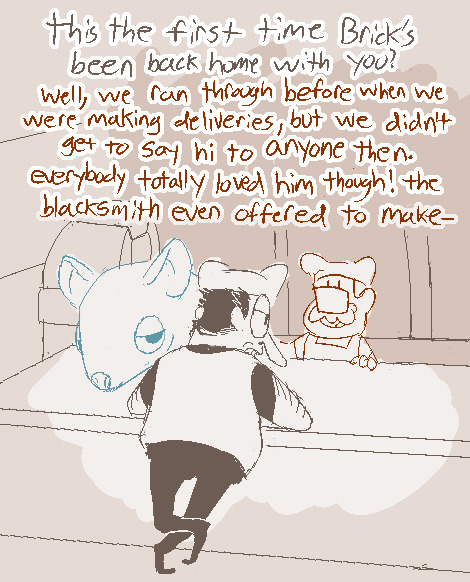
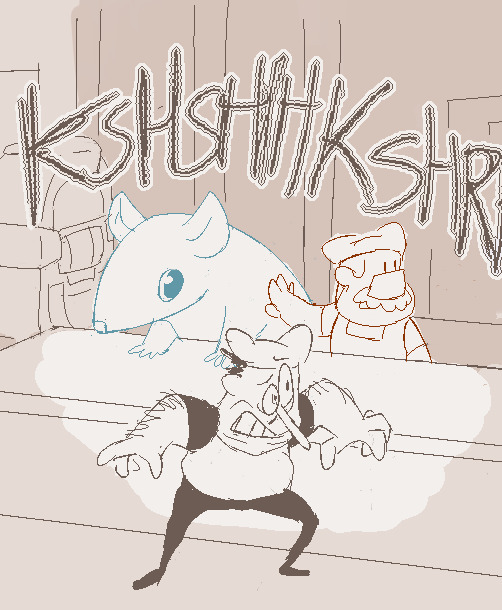

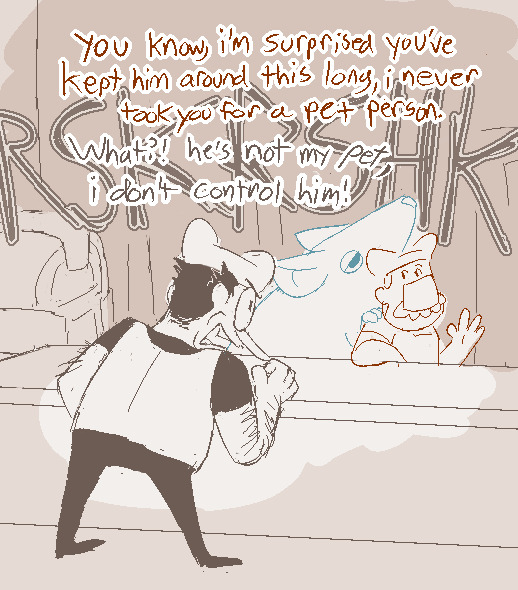
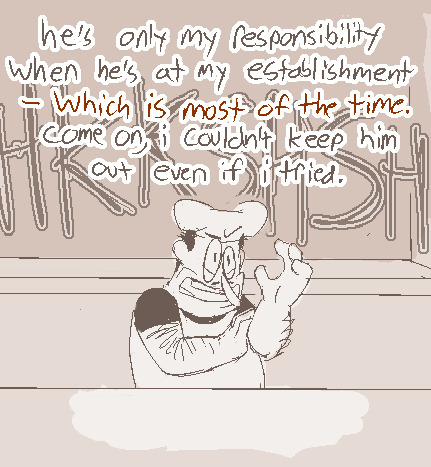
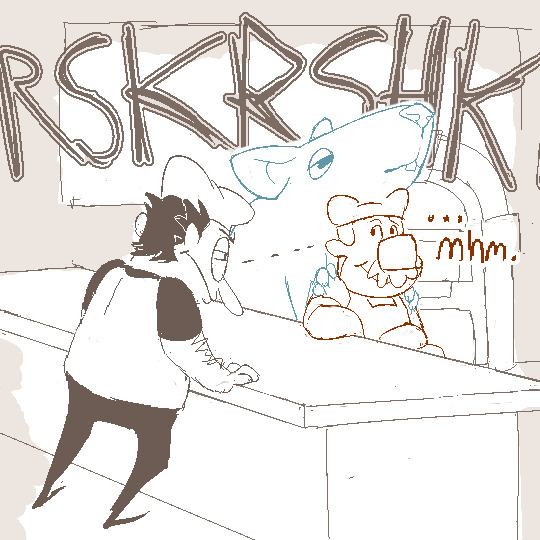
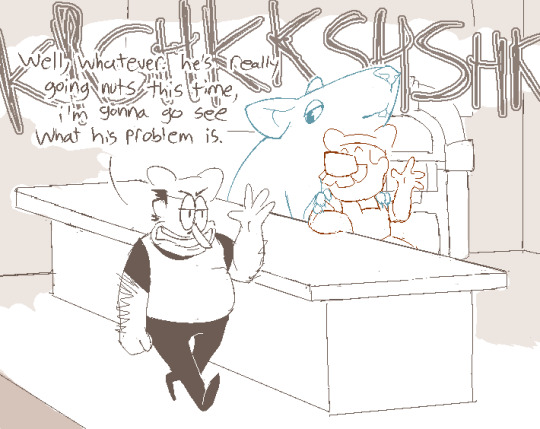
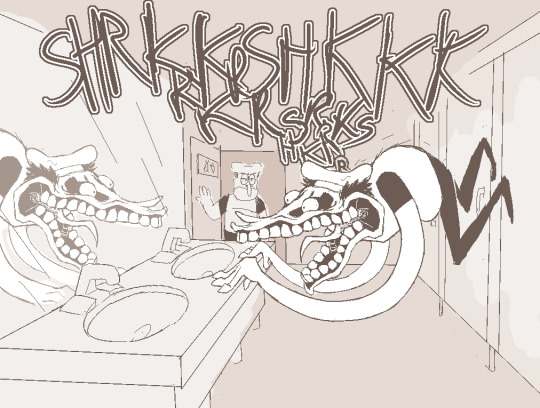

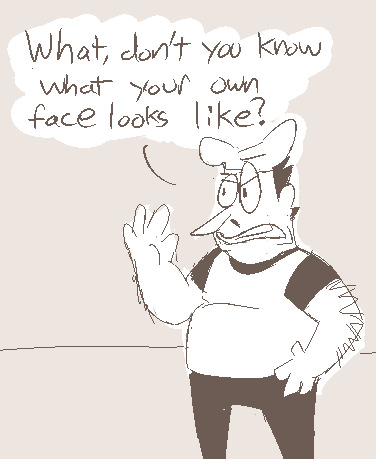
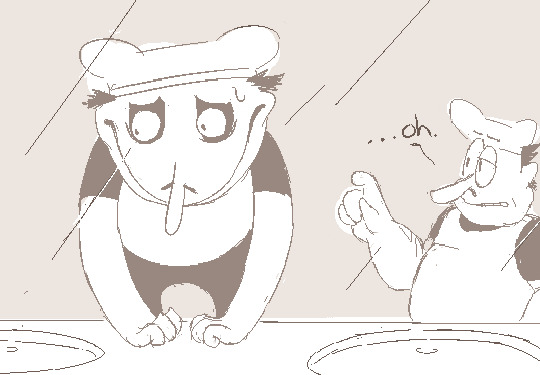
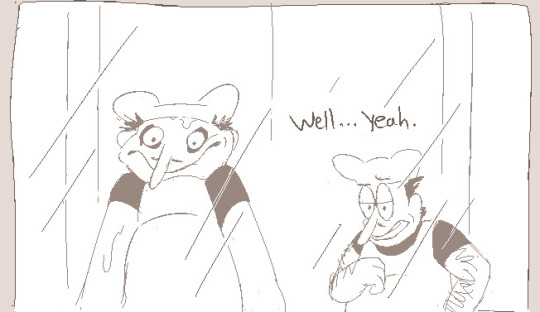

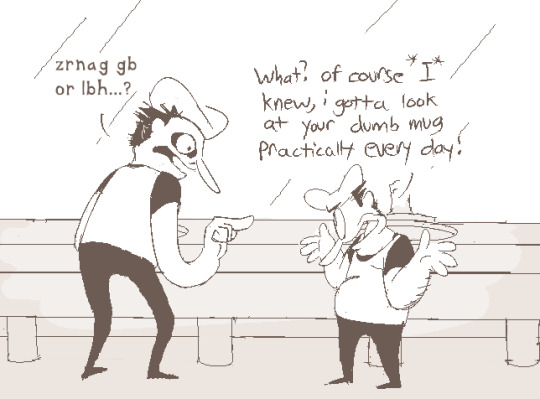
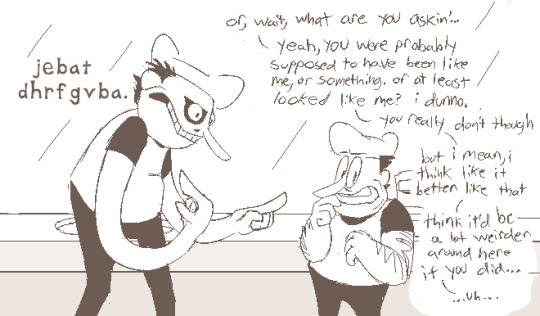
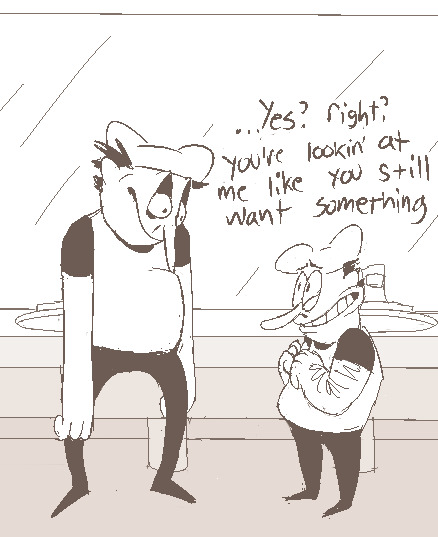

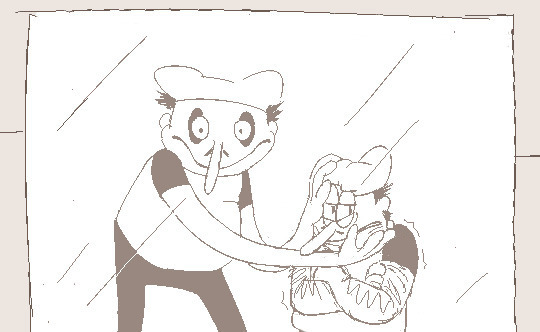
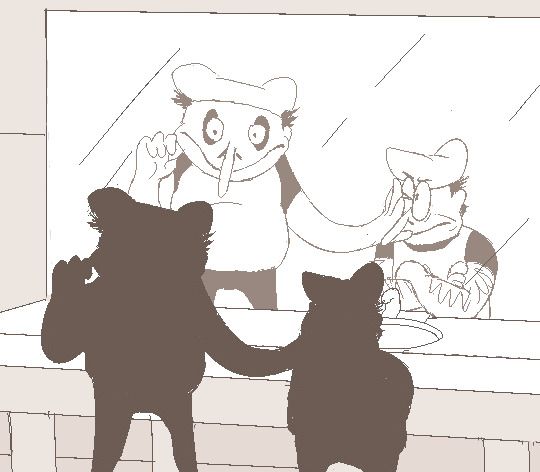
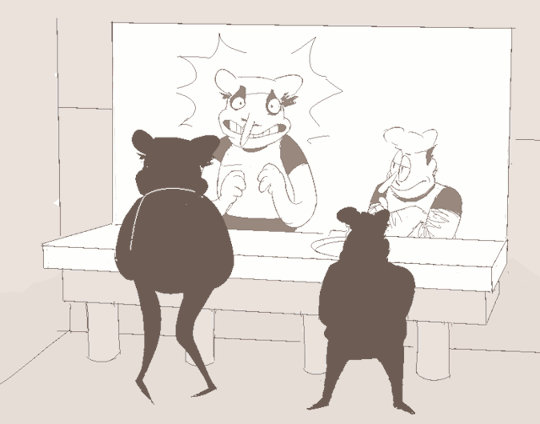
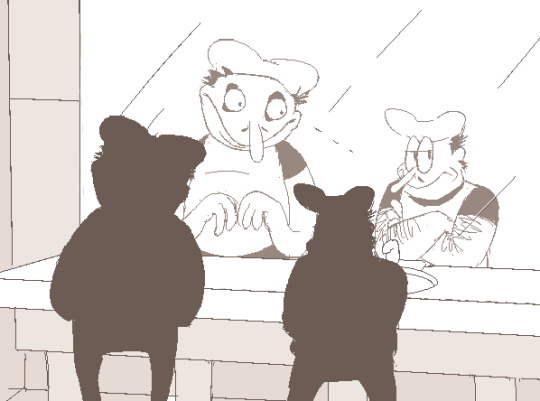
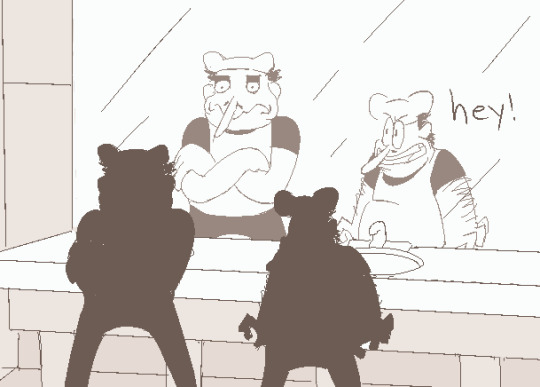

there's no way the bathroom at peppino's pizza is actually that big but ¯\_(ツ)_/¯ . hey ummm anyway.... i care them...... anyway there's a lil ramble on my take on fake pep's like psyche or whatever in tags on the og post if ur into that kinda thing :y
hey! it's a series! fake peppino world tour: [noise] [noisette] [peppino]<- u are here [gustavo] [gerome] [noisette again]
#ramble after realtags yeag. shoutout to serrangelic btw suggesting the silhouettes thing bc i would have Died otherwise#pizza tower#peppino spaghetti#fake peppino#gustavo and brick#arting#pizzaposting#so anyway i think fake peppino has like. a general awareness that he is supposed to Be Peppino and that he was Made to do that#and likewise he does generally try to...do that. the thing he does NOT realize is hes like really goddamn bad at it#not to be mean but like...c'mon. they are pretty distinctly different kinds of guys even beyond the physiology yknow.#he's neither on-brand nor fooling anyone dsjdsjjkgfsd. BUT!#since the rest of the cast generally likes him [at least as I play it] he thinks hes doing just fine#he's like 'oh they r happy with me so i must be getting a good grade in being peppino :)'#so getting told that 'yeah you actually really suck at that but that was never the reason people liked you'#and told that by og model peppino no less--yknow THE guy he's supposed to be living up to#who's already a bit intimidating for that and who ALSO totally wrecked him TWICE in the tower#making him acutely familiar with just how formidable the guy is and how much there IS to live up to....#it's a Moment for sure. not really a sad or hurt one though. just... contemplative.#thinking abt people liking him for being the guy he's already naturally been being even though that guy is Not Peppino#i don't think he's gonna be super broken up about realizing he has a bad grade in peppino given everything else hes got now#nor do i really think he cares enough to go like reinvent himself or whatever after the fact#he seems to b pretty clearly having fun with it already so i think he just keeps doing that#and in some cases he still has the pre-installed peppino traits/instincts like to cooka da pizza. and that's fine#is this projection. yes. but if youve been following me awhile you know most of my character writing is ghdhfdgf#gonna kinda expand on all this in the gerome one which is...one after next. itll be a bit but man.#anyway peppino will never admit to anyone and especially not himself that he's gotten a little attached to the guy. hee hoo#pep tends to be kinda surly but he certainly has his ways of showing he cares. all of which are on display here#''that thing is not my son'' says man currently watching thing's antics with the 'bemused dad' arms crossed pose. yeah ok buddy.#gus is totally onto him already but hes not gonna say anything.#if u read all this ur prize is not having to go decode fp's rot13. his lines are ''meant to be you...?'' and ''wrong question.''
1K notes
·
View notes
Text
to preface this post i am anti-advertising i think we should explode the entire industry but it's sooo funny when you people make posts like "and they don't even work!!" like. sorry to be the bearer of bad news but yes they do. that's why we have to put up with so many despite everyone hating them and thinking its annoying. because they actually work really well and make a shit load of money
#it actually would be way better if they didnt work and made no money bc businesses would abandon them#this isnt like stocks where everythings abstract and is essentially gambling (i dont understand stocks)#like ppl in the ad industry create things. that make a tangible and quantifiable impact on the business#which is then used in further ad planning. it is NOT all smoke and mirrors#like its fake in that the industry is not providing a necessary service the way like. grocery stores are#but its not the level of fake where everything is abstract like theres deliverables#moreover there is an extensive body of academic work specifically on how to make ads more effective#ALSO i think some of u views ads like. as if they have a win condition. which is you buy product#but in current advertising this is pretty rare and comparatively ineffective#which is why you see MANY ads which dont seem to be selling anything in particular. or which have nothing all to do with the product#the 'win' condition for THAT kind of ad is something more like 'viewers remember our name'#like. ex i would say ads for temu have not been effective on me bc i havent bought anything from them#but temu probably thinks they were SUPER effective on me because i talked abt them like 5 different times at work#and i do in fact know exactly what the company does and what they sell#and they were able to capitalize on the reputations of existing companies (wish shein etc) to build their own brand#good idea generator
718 notes
·
View notes
Text

💘
#this might be the most scribble thing I post here yet bahahahahahahahahahahaaha#I still like how the hands turned out even though I didn’t finish them😇#but it’s pretty messy and the hands might be the only part I like🥲#but since this blog is my art journey documentation here you are#I was pretty busy today so no good art but maybe tomorrow we’ll see#I am preparing things to FINALLY answer my asks🥹#& if you tagged me in anything I actually have been meaning to respond!!!!!!!! my notifications are the WORST and so confusing on here😵💫#and I’m technology grandma…#hope u all have had an amazing day !!!! 🫶#my brother in law has been fishing and catching SO MANY sargo#(sargo = sea bream for the animal crossing playing English speakers😙)#AND ITS LITERALLY SOOOOOOOOO DELICIOUS !!!!!#i cook it in the weirdest way possible#you just have to gut the fish and cut off its fins etc#then you put it in a wet salt bed and cover it up…cook it for 30 min…AND VOILA ITS DONE !!!!!#I don’t add any spices…NOTHING…and this fish literally has the taste and texture of crab covered in butter#LIKE…😳 it might be my favorite food/fav thing to cook these days bc it’s so easy and fresh caught fish is just delicious😫#well that was my grandma cooking show of the day👩🍳#now you know how to cook sargo a la sal 👩🍳#also going back to the drawing🥹 I just love these two so much…#I love thinking of sweet moments…most of my angst is confined to writinc😆#the chapter I’m writing right now is SO ANGST DEPRESSING (sorry Eloise)#it will get better…I promise…#hogwarts legacy#hogwarts legacy fanart#hogwarts legacy oc#hogwarts legacy mc#eloise babbit#sebastian sallow#sebastian sallow x mc
116 notes
·
View notes
Text
Summon Night: Swordcraft Story (ATLUS, 2003)
#my actual posts lol#haha what if i made a daily diary post thing like nico#..i was just thinking#today was a good day#and i thought of this song#ive been playing summon night swordcraft story a lot as of late.. though none today actually#its still on my mind though#i considered using dweller empty path's song flying through a stary sky instead.. but this is what i thought of first#i think it fits best to use it#i actually had to jump through some hoops to upload music!#cus my tumblr app is kinda old.. i cant properly upload music. i could only put a link#which isnt exactly ideal#so i tried in my web browser.. but maybe its cus i havent updated it in a while or maybe just cus its tor.. it didnt work#so i downloaded firefox and did it on there lol#now im editing it in my drafts back on the app#dont ask why im not just doing it on my computer... shes having some technical difficulties. we're working on it#but not today#...#today was pretty eventful.. even if not very productive. but ive never been a very productive person#we went and saw some light festival thing! it was rly nice.. a little simple at times but it was fun#we went and got some yummy snacks earlier too! tho ive already eaten them all hehe#and i started up animal crossing new leaf. i hadnt played it in ages! its startling how much better it is than new horizions.. imo at least#only problem is i couldnt make it the same as my island.. and i didnt remember why i named my last town#we searched for a while for some reference or somfin to name it after.. but we ended up just going with ''faraway''#cus i liked the idea of being asked where im going.. and just saying far far away#and as beth said it has a kinda fairytail vibe!#...only after i named it did i realize i accidentally named it after the town in omori. oops!#...im about to hit the tag limit. so whoevers still listening i just want u to know..#i love you. ok?#goodnight
373 notes
·
View notes
Text
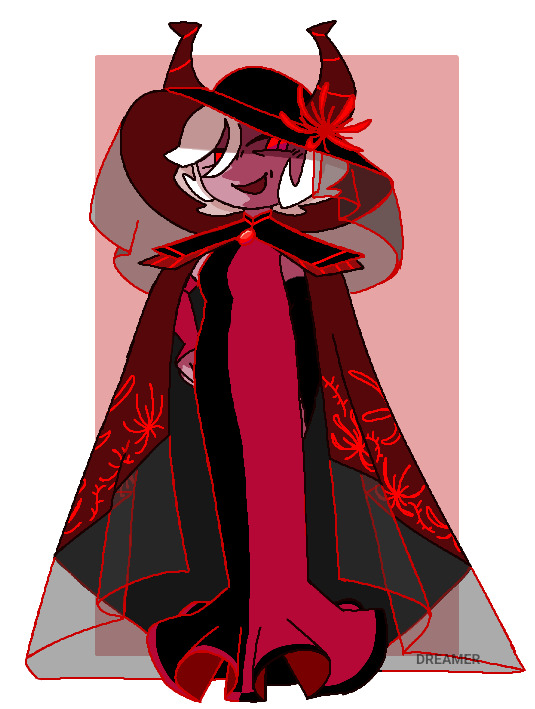
Dark enchantress cookie redesign
#I've been thinking about her recently#my only knowledge of her is from kingdom so thats the only version i know but she actually seem pretty empathetic all things considered#i mean she raised velvet and keeps members of the cod that probably hinder her progress [COUGH COUGH licorice and poison muchroom COUGH]#dont get me wrong i like them alot and i think the are sweet but for a while i really didn't understand why she kept them around because of#the way all the cookies talk about her charater#she would seem verry tough love or just ruthless but in actuality she just keeps adopting these weird cookies she finds#she also knows what they are good at and plays into those strength. pome is good at keeping things organized. Mushroom is good at#keeping others guard down. licorice is willing to work hard to succeed at any task given#choco is good at fighting and keeping his team safe. she clearly knows them fairly well and also sometimes supports the stupid stuff they#want to do#i would say pome is more ruthless then dark enchantress herself#anyway i have more thoughts about her but I'll save them for a later time. thanks for reading ig ^^#dark enchantress cookie#dark enchantress crk#crk#cookie run kingdom
104 notes
·
View notes
Text






The X trilogy + "psycho-biddy" influences
#x 2022#pearl#maxxxine#x series#strait-jacket#psycho#what ever happened to baby jane#horror#psycho-biddy#hagsploitation#made this whole big thing which i still might post eventually but. in terms of aesthetics. this abridged version is better lol#i'm not gonna finish the other post tonight but consider this a preview of sorts#i can't stop thinking about what if they leaned more into the 'hagsploitation' aspect of it all lol#i actually find it odd + off-putting that they start and end maxxxine with a bette davis reference#with a big significant psycho cameo at the bates motel itself#and there's not really any payoff for those allusions!!#i think if you're gonna try to tie into a legacy of older horror films you should do it in a sincere way#because that just felt like 'elevated horror' bonus points + nostalgia bait#anyway. it's fun to think about the potential it had + how all the building blocks exist within the narrative to do something interesting#and i am a 1960s hagsploitation subgenre apologist lol#what ever happened to baby jane? changed my brain chemistry the first time i watched it as a kid#so maybe i'm just nostalgia baiting myself making these connections lmao#but it could have been so good#it could have been the perfect synthesis of the shared themes across all three movies#but i don't think hagsploitation gets butts in movie theater seats like girlboss 80s nostalgia vaguely true crime related shit#oh wait also i guess calling psycho a hagsploitation movie is like. probably not 100% accurate#but it is though. it's not an inversion of the subgenre bc the subgenre didn't exist yet#but it builds up a mystery 'psycho-biddy' character only to reveal that she's not the murderer#which is also what happens in strait-jacket so i think it counts!!#+ psycho is directly referenced in all 3 movies so it’s a pretty clear influence on the trilogy as a whole
91 notes
·
View notes
Text






some mcr patches i impulsively made using cut up bits of painting canvas + pens and alcohol markers
#is painting canvas the best material for patches? probably not but i dont care#i have been frothing over the thought of patches for a bit now and i suddenly realised that canvas could work#originally i only intended to make a patch for each album but then i (a pretty new mcr fan)#found out about pool boy at the vampire mansion and knew i HAD to include it#im sooo happy with how the demolition lovers turned out i had the perfect size/shape scrap of canvas for them#i also really like the better living patch which i (again) didnt know was a thing until recently#i dont actually want to permanently alter my good pair of pants so i plan to just attach these using safety pins when i feel like it lmao#my chemical romance#mcr#patch#patches#justa's art
93 notes
·
View notes
Text
Voice actors are NOT the same as actors.
It takes a specific kind of skill-set and training to be able to warp and meld the voice. It takes a certain kind of talent and dedication to hone that talent into the ability to meld the voice and invoke emotion with one's voice alone. Actors are used to using their voice secondarily to their body language and their facial expressions. It's all mirrored back on camera. They do have nuance. But it's a different kind of nuance and a different kind of training to produce that nuance.
Voice actors might get their likeness transposed on their character's design, and maybe their mannerisms might seep into the character's animation. But when it's all said and done: their presence is in their voice. They are bringing a character to life, showing that emotion in their voice, trying to keep a specific accent, drawl, pitch, tone in that voice and keep it consistent for their recording sessions.
The voice actor is like a classically trained musician who can play first chair in a competitive, world-renown orchestra. The actor (who fills the voice actor's role) is like a moot who played violin in beginner and intermediate high school orchestra and thinks they can get into Juilliard with that 2-4 years of experience.
This doesn't mean that the HS orchestra moot can't play. They can even be really good at it. Maybe they won competitions and sat first chair. But they are not in the same league as the person who's been training their whole lives and lives and breathes to hone their craft using the instrument and all of the training they've ever acquired to perfect it. They are not meant for the same roles. They are not in the same caliber. You do not hire the HS equivalent when you want to play complex music in a competitive orchestra.
Actors are not the same as voice actors.
And furthermore, actors - especially big name actors - taking the roles of animated characters for big budget films or TV pilots makes no sense anyways when - at least in the case of TV pilots - there's not a point to hiring a big budget actors anyways. That money could be used elsewhere (like paying your animators), and the talent that is brought onto the screen for X character could then be hired on to voice said character no recasting required.
I wouldn't say voice acting as a profession is in danger exactly, but it's certainly being disrespected and overlooked for celebrity clout, and this has ALWAYS been an issue. Shoot, even Robin Williams knew that much - which is why he tried so hard not to be used as a marketing chess piece for Aladdin and got royally pissed off when it happened anyways. People shouldn't go to any movie (but especially not animated films) because "oh famous actor is in it". People should go because it's a good movie and the voice acting is good.
People who honest to god think that voice actors are replaceable because "oh well anyone can voice act" or "I like xyz celebrity so naturally it'll be good" ... Honestly I just wish you'd reassess your priorities because you're missing the point and are part of the problem.
Voice Actors ≠ Actors.
#(i am incredibly passionate about this)#(and seeing celebrity voice actors in what should be a voice actor's role completely burns my buns it doesn't matter WHO it is)#(hemsworth as optimus? someone tell me one good reason why they couldn't get a good v/a to replace mr. cullen properly for the future)#(ben shwartz as sonic? dude literally isn't even a good voice actor OR actor anyways-)#(- A N D jason griffith AND my boy roger craig smith are still RIGHT HERE)#(jason griffith IN PARTICULAR would have pulled back SO many sonic fans that went to watch the film anyways. if not /more/.)#(and on top of that he has the same tonality and energy they tried to force this moshmo to try and emulate anyways so GET THE REAL THING)#(chris pratt as mario? i can at least defend /him/ and say that barring his failure to do a NY accent consistently he wasn't terrible)#(but mario's new voice actor could've been used instead and people would've clearly appreciated that WAY more)#(vanessa hudgens as sunny starscout in mlp g5's pilot movie? literally why. they replace her and hitch's va in the show.)#(don't even get me started on the concept of hiring celebrity singers to do musical theatre roles or not letting musical theatre singers-)#(-dub the celebrity voice actors you just HAD to hire for your film bc you're so worried about not getting enough clout to get ppl in seats#(that you're putting it all in this (1) big name hire bc turns out that you have no faith in your writing ability much less-)#(-animation as a medium.)#(and no before anyone says anything : no this is not me saying that ALL celebrity voice castings are bad.)#(there are some that aren't that bad and others that are actually pretty good.)#(i especially appreciate it when actors are damn well aware they aren't voice actors and try to LEARN from voice coaches-)#(-and/or their va predecessors if applicable.)#(that does not change the fact that the celebrity shouldn't have been hired just because the film wanted to have bragging clout-)#(-oh look at this FAMOUS PERSON we were able to hire — yeah ok. sure wendy. i want to know if this film is quality or not.)#(and 9/10 times the SECOND there is money spent on a non voice actor to voice the main character especially)#(that usually means somewhere along the way animation IS going to get shafted. if not w the animators themselves then in the way of-)#(-the actual animation itself and ESPECIALLY the screenwriting because it's especially been so dogshit lately even before the strike.)#(a celebrity being hired to fill a voice actor's role is such an immediate red flag to me and it is VERY rare that i get to be proven wrong
111 notes
·
View notes
Text
stacy is sooo interesting because she's in love with house but knows that they will never ever be able to have a healthy, stable, sane relationship because they're too similar so. she finds house-lite instead and marries him and. essentially moves on with her life! and is successful in this because she's a moderately well-adjusted person!
wilson, in contrast, never manages to escape the inevitable, in spite of his best efforts to find a house-lite of his very own, because he's an absolute fucking freak and ends up glued to house to the bitter. bitter end
#yeah im too sleepy to revise this. UNFILTERED posting wooahh#some may b shocked but i do actually read thru most of my posts several times to make sure i didnt accidentally write mein kampfe 2#recently ive come to the realization that i am in fact not an incredibly chill person#and that the constant paranoia and fear in which i live my life is actually PROBABLY a symptom of severe anxiety#like damn. ive always known that im pretty prone to depression but ive preetty much always been aware of that#my mom is a chronic depressive so i know the symptoms i know the signs i have a pretty good arsenal of healthy coping mechanisms#UNFORTUNATELY mommy's mental health problems did not help her not abuse me as a child#so i ended up being a terribly anxious kid who was constantly being screamed at and told i was overreacting (because i was. because i had#a severe anxiety problem that was making me react irrationally.) to everything all the time#which is you know. it is VERY difficult to deal with a mental health problem when you arent aware you have a problem!#its incredible how much. better. my life has gotten since i figured this out and started actively trying to work out what triggers it#and being able to like. realize 'oookay. there is an Issue here and it needs to be overcome'#instead of just beating on myself constantly for not being able to do things without feeling sick or getting breathing problems!#anyways. trauma dumping in tags is over now!#house md#hilson#greg house#james wilson#stacy warner
556 notes
·
View notes
Note
Thinking about the exquisite imagery of Bucky shaving his mustache, while in contrast Buck let’s his scruff grow in. I can see it so clearly: Bucky shaves the ‘stach when they’re in the POW camp as a result of losing a bet (it’s highly probable he lost of purpose because he wants to give the men an opportunity to laugh it up). But it totally goes sideways once it becomes clear how young he looks without it. Buck on the other hand is stressing over this new change enough to forget to shave for a few weeks straight. Is this brain rot due to me thinking about Callum’s look in the Green Room combined with Austin’s look in the Bikeriders? Yes. Please send help.

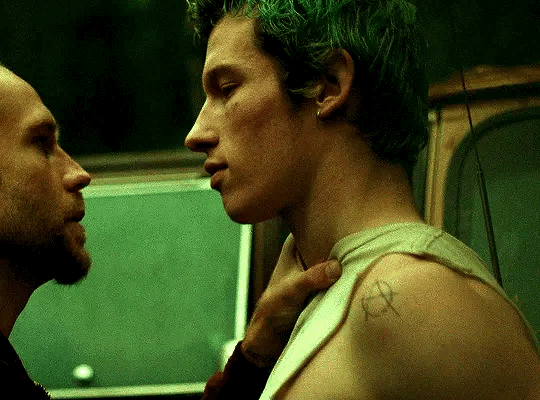
in case anyone needs a lovely visual! (ʘ‿ʘ✿)
okay, while i PERSONALLY am in love with bucky's stache and feel like shaving it even in fiction would be an absolute travesty, i see the vision and i agree, i could totally see something like that happening.
john does it as a joke/for a bet and figures that hey, they're all gonna be stuck in the camp for a while anyway, chances are it'll grow back by the time it really matters. no big deal, and it gets laughs in a place where those are increasingly rare, even if he has to suffer through relentless teasing about his baby face for a few weeks.
gale does not deal with it nearly as well, however; it throws off any routine he's built and it feels ridiculous because it's just facial hair but it's such a big change after the monotony of day–to–day behind the fence that it's enough to rattle his brain. and letting his own facial hair grow out probably isn't even a conscious choice, almost like a mindless way of falling back into sync with john as both of theirs grows back.
if buckbucky is an established thing in this verse, we all know damn well john would be obsessed with gale's scruff, rubbing his own cheek up against it like a cat, thirsting over it and ogling him 24/7.
and the way it feels against his thighs, stubble burn leaving the sensitive skin a pretty pink when gale's face is between his legs...
john would be devastated and pouty when it comes time for him to finally shave it, but gale would promise him "when we get out, i'll let it grow back for a bit, yeah?" and that would perk him right up. <3
#i've actually been toying with an AU with gale and john but how they look in the bikeriders and green room/the only living boy in new york#and i have many Thoughts but i need to flesh it out more#and i probably won't ever do anything with it because i have too many things i want to write but it's a nice (hot) concept <3#also have y'all watched 'leaving' with callum turner bc good lord.#john looking like that pretty twink and crushing on intimidating bikeriders!gale??? the daddy issues vibes?? helllooooo meow LMFAOOO#buck x bucky#buckbucky#johnslittlespoon asks#johnslittlespoon brainrot#johnslittlespoon spicy
126 notes
·
View notes
Note
Hello! I hope I won't sour your mood with this ask but I have been thinking a lot about your gay dogs this month especially.
I'll just try to keep the context short but in general I'm someone that has accepted being romantically undesireable. It was hard but in the end I have built my life just around me, my humble family and at this point in time I don't even think I have the time for a partner. And considering that it's the love month and a lot of people are preparing to celebrate it with their SOs I assumed that, actually, this is a thing that I sort of have in common with Machete.
From the miscellaneous lore on your profile I see Machete as someone that also has kind of rejected love. That also has built his life around his job, possibly hobbies, his family or mentors (depending if we're talking about canon or modern au). Who kind of forgot that relationships are a thing and that people bond with others in that way. Well, at least he did until meeting Vasco.
I just love thinking about their awkward beginnings. Machete being 100% sure that Vasco is just joking, maybe even sometimes teasing him (in a friendly banter type way) or just explaining to himself that all that kindness and interest is just him being a very considerate friend. And then we have Vasco that just tries to be subtle, as if he was trying to pass a fawn without it noticing and running away, but also with time gains confidence and tries more risque moves. Vasco being all smug and Machete being flustered when their hands or shoulders or tails brush in passing. And then when both are sure of their feelings we have Machete who has to choose between God and his love. Who, at first, unwillingly accepts that divine wrath will be worth their brief love.
I just love your boys. I swear they are all the love supply one might possibly need
Thank you for such a long and thoughtful message! I don't know why you thought you might accidentally sour my mood, I'm utterly delighted whenever I hear that someone has been pondering my little guys (rotating them in their head, as they say), and when they go through the trouble of sharing their findings and conclusions I'm so happy I could crawl up a wall.
I think you deciphered Machete's inner workings very well, especially those of the original canon version. The concept of love is of course prominent in Christianity, so even as a kid being raised in a religious environment that discouraged overt displays of affection and close personal bonds, Machete wasn't completely alienated from it. But it has always been a nebulous, unperceivable and unattainable thing for him. When he was old enough to lock down his career choice he readily accepted he'd never have romantic relationships, spouse or a family, and I think he must've been too young and socially inexperienced to think of it as a significant loss. Either he consciously blocked out the need for companionship by studying and working like his life depended on it, or he didn't really consider that being genuinely befriended, appreciated and loved as a person instead of a respectable and competent authority figure was even an option for him, at least not until Vasco came along.
#I think it took some time to get through his initial defences#especially since when they first met the stressful apprenticeship period was still fresh in Machete's mind#the years under his explosive and gaslighting mentor's wing had made him very distrustful so he preferred to just stick to himself#Vasco is good at winning people over and once he convinced him that he didn't have any ulterior motives they became besties pretty quickly#and even though the line between platonic and romantic started gradually blurring Machete kept convincing himself#that his feelings for Vasco were just Very Deep Friendship#and Vasco has an eye for noticing these things and a bolder personality#so when he tried to reciprocate a little bit Machete thought 'what a good friend he is'#'so kind and considerate and I'm so grateful and lucky to have him and I must not ruin things by getting too personal'#it was awkward and at times a little bit painful but I'd like to believe the progression was for the most part smooth and natural#considering the circumstances it could've been a lot more distressing#as corny as it is I think they were just happy to have found each other#they advanced at the same phase and reached the 'I think we've become a couple actually' stage at the same time#at least that's how I imagine it at the moment#answered#anonymous#Vaschete lore#long post
174 notes
·
View notes
Text
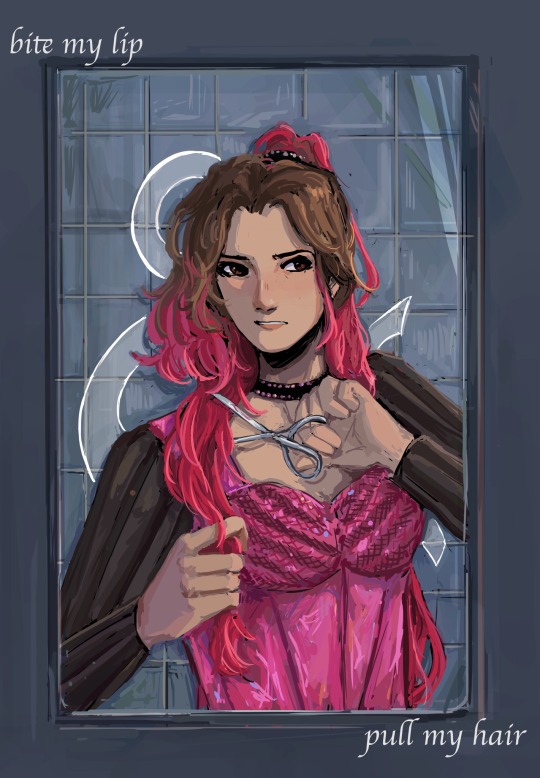
fairest of the fair
#hi! im alive and back and etc.#six the musical#six the musical fanart#katherine howard#thinking of that post going 'i think eventually you become the person you needed most' and like maybe that's the thing with my art#this started out as a redraw and <improvement meme> i think i've finally reached the stage where i'm making the things that my younger self#aspired to create. like i can do this now! i've reached That level of technical skill! tiny me would be so proud. it's very gratifying#redraw from august this year actually. i've made a surprising amount of improvement HAHA maybe it was the adamandi stuff getting me#back into digital rendering. i think that obsession has quietly slipped away but yknow. one never truly leaves a fandom. just less intensit#also speaking of old fandoms! we're back with the six stuff haha. as of writing i'm in the midst of blog revamp- figuring out how to chill#multifandom status doesn't mean ditch all the old stuff ! but i do feel much freer and less stressed. i think hiatus has been good for me#notes on this piece particularly: redraw about cutting hair and thinking of the lyric above. also lowkey &j ref + pinterest poem excerpts#of female suffering. and maybe a dash of amanda heng let's walk inspo. this work is really just full of contradictions..#1. the mirror and cutting hair as an act of self liberation 2. the & is part of the lyric but also a nod to &j (in another iteration it was#pink but the white looked better) and like. &j is really all !!! girl power!!! etc. and i was like hmmmm. also matching pink shiny aes#3. the frame as a cage; the mirror as a self reflection idea (ie. saville's propped insp) but also as a sign of vanity. 4. sparkly costume#and pretty pose- read one too many poems about women feeling like they have to be pretty even in their suffering. something i wanted to#explore. and also in 5. the show itself... all you wanna do is. despite all the dancing and pink and sparkly the content of the song is#darker. and even though it's a story of her suffering it's still presented as a shiny fun pop song and ajshdhfhfh ok... 6. the lyrics fall#outside the frame. sort of a caught inbetween. sort of a trapped in the narrative and yet#within the frame it's all. vaguely handwavy breaking free vibes. like i said contradictions?#7. cutting off the long ponytail vs the pull my hair lyric at the end. yeah#8. the blocked off & looks a bit like scissors. positioned to cut right at the neck#anyways yeah irl remains hectic! but if i get around to more doodles they'll appear here :)
302 notes
·
View notes
Text
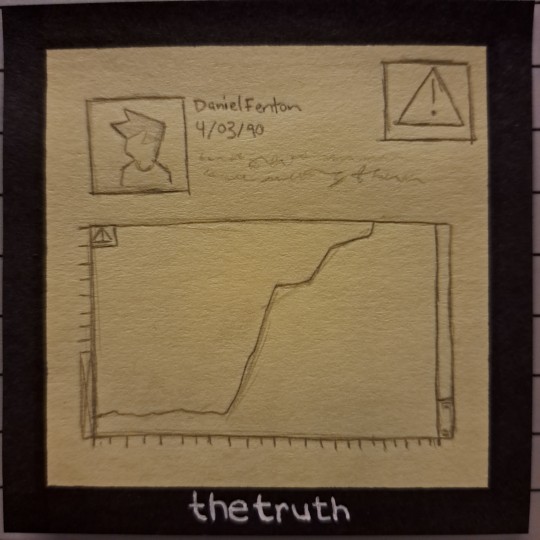
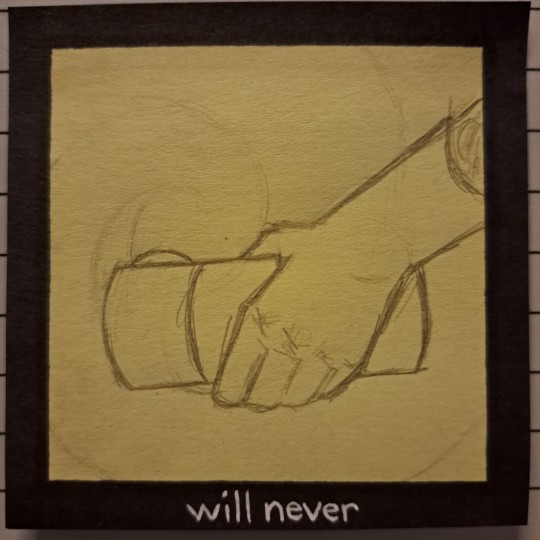
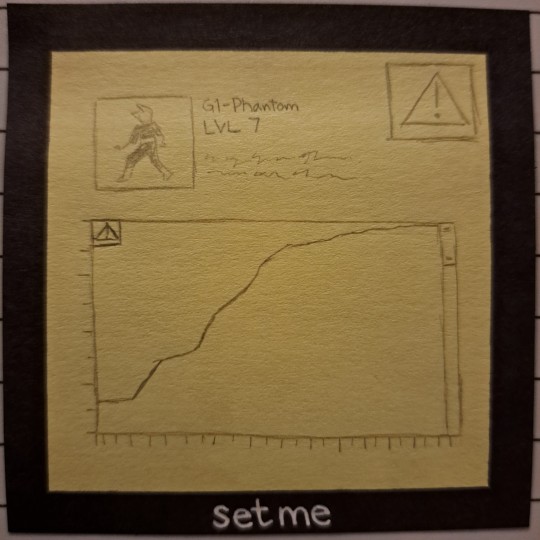
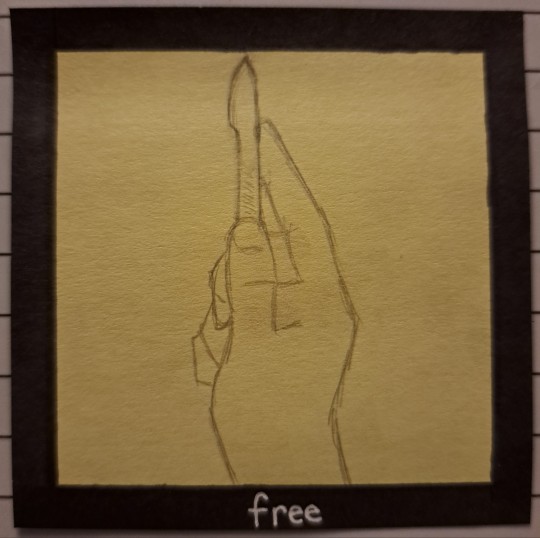
(they'll never understand) How could I ever understand? No, I don't have to understand. I don't wanna understand. So I will never understand. (we could have everything)
#Danny Phantom#art#sketches#i do not feel like colouring this. you'll have to use your imagination#also i highly recommend listening to Nick Lutsko's Swords album because it is so Jack & Maddie it's not even funny#i've been listening to Superior on repeat for like 2 days which is why i whipped this comic up#but also Sideshow is how i was introduced to the album & is also very very very much Maddie & Jack coded#i want to write a fic about it. alas i'm already writing like 10 fics about everything right now so it'll have to wait#i just have this idea in my head of it actually being pretty obvious to Maddie & Jack who Phantom is#he's wearing their hazmat. using their inventions. can open their biometric locks. has their son's face. his voice.#Danny Fenton has an extremely high level of ectoplasm. he even has an ectosignature. the same ectosig as Phantom in fact.#but they're so in denial. so obsessed with their work up til then not being a waste of time & resources. that they just keep ignoring it#keep burying their heads in the sand#& things just keep getting worse. & they keep having a harder time committing to attacking Phantom#have a harder time believing in what they're doing. have a harder time explaining away the truth#but they can't face it. they have to keep refusing to see it#because the truth will never set them free. it will only confirm all the terrible things they've done.#they're good people. everything they do is good. there is no other side to this story. of course
73 notes
·
View notes